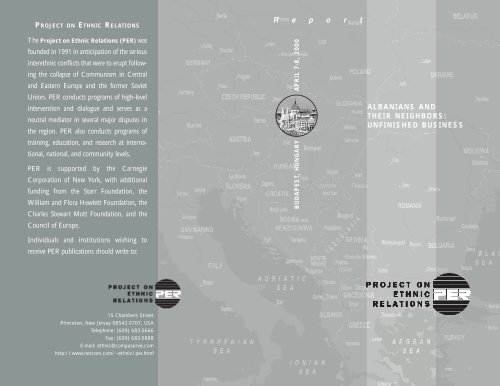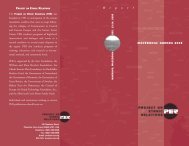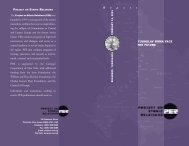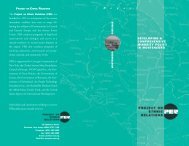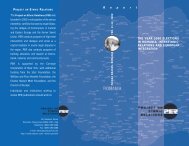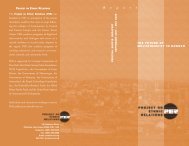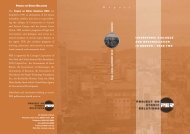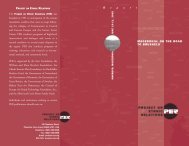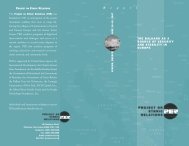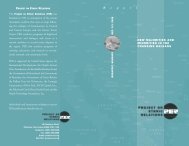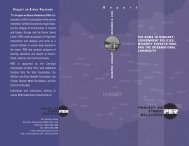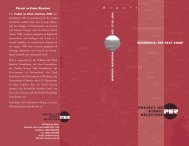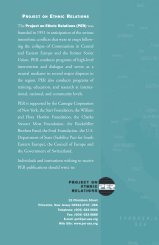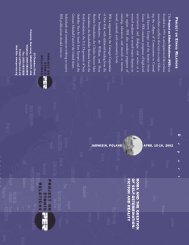Albanians and Their Neighbors - Project on Ethnic Relations
Albanians and Their Neighbors - Project on Ethnic Relations
Albanians and Their Neighbors - Project on Ethnic Relations
Create successful ePaper yourself
Turn your PDF publications into a flip-book with our unique Google optimized e-Paper software.
PROJECT ON ETHNIC RELATIONS<br />
The <str<strong>on</strong>g>Project</str<strong>on</strong>g> <strong>on</strong> <strong>Ethnic</strong> Relati<strong>on</strong>s (PER) was<br />
founded in 1991 in anticipati<strong>on</strong> of the serious<br />
interethnic c<strong>on</strong>flicts that were to erupt following<br />
the collapse of Communism in Central<br />
<str<strong>on</strong>g>and</str<strong>on</strong>g> Eastern Europe <str<strong>on</strong>g>and</str<strong>on</strong>g> the former Soviet<br />
Uni<strong>on</strong>. PER c<strong>on</strong>ducts programs of high-level<br />
interventi<strong>on</strong> <str<strong>on</strong>g>and</str<strong>on</strong>g> dialogue <str<strong>on</strong>g>and</str<strong>on</strong>g> serves as a<br />
neutral mediator in several major disputes in<br />
the regi<strong>on</strong>. PER also c<strong>on</strong>ducts programs of<br />
training, educati<strong>on</strong>, <str<strong>on</strong>g>and</str<strong>on</strong>g> research at internati<strong>on</strong>al,<br />
nati<strong>on</strong>al, <str<strong>on</strong>g>and</str<strong>on</strong>g> community levels.<br />
PER is supported by the Carnegie<br />
Corporati<strong>on</strong> of New York, with additi<strong>on</strong>al<br />
funding from the Starr Foundati<strong>on</strong>, the<br />
William <str<strong>on</strong>g>and</str<strong>on</strong>g> Flora Hewlett Foundati<strong>on</strong>, the<br />
Charles Stewart Mott Foundati<strong>on</strong>, <str<strong>on</strong>g>and</str<strong>on</strong>g> the<br />
Council of Europe.<br />
Individuals <str<strong>on</strong>g>and</str<strong>on</strong>g> instituti<strong>on</strong>s wishing to<br />
receive PER publicati<strong>on</strong>s should write to:<br />
R e p o r t<br />
BUDAPEST, HUNGARY MA APRIL 7-8, 2000<br />
ALBANIANS AND<br />
THEIR NEIGHBORS:<br />
UNFINISHED BUSINESS<br />
15 Chambers Street<br />
Princet<strong>on</strong>, New Jersey 08542-3707, USA<br />
Teleph<strong>on</strong>e: (609) 683-5666<br />
Fax: (609) 683-5888<br />
E-mail: ethnic@compuserve.com<br />
http://www.netcom.com/~ethnic/per.html
ALBANIANS AND<br />
THEIR NEIGHBORS:<br />
UNFINISHED BUSINESS<br />
BUDAPEST, HUNGARY<br />
APRIL 7-8, 2000<br />
©Copyright 2000 by <str<strong>on</strong>g>Project</str<strong>on</strong>g> <strong>on</strong> <strong>Ethnic</strong> Relati<strong>on</strong>s
TABLE OF CONTENTS<br />
Preface 1<br />
Note <strong>on</strong> Terminology 3<br />
Introducti<strong>on</strong> 4<br />
The Issues 4<br />
The European C<strong>on</strong>text 6<br />
The Political Status of Kosovo 7<br />
Is a Multiethnic Kosovo Possible 10<br />
Next Steps 14<br />
Albania <str<strong>on</strong>g>and</str<strong>on</strong>g> <str<strong>on</strong>g>Albanians</str<strong>on</strong>g> 16<br />
Maced<strong>on</strong>ia 18<br />
M<strong>on</strong>tenegro 20<br />
Serbia 22<br />
Carpe Diem 24<br />
List of Participants 25<br />
Other PER Publicati<strong>on</strong>s 29
PREFACE<br />
On April 7 <str<strong>on</strong>g>and</str<strong>on</strong>g> 8, 2000, senior Albanian politicians from Albania,<br />
Kosovo, Maced<strong>on</strong>ia, <str<strong>on</strong>g>and</str<strong>on</strong>g> M<strong>on</strong>tenegro met with leaders of the democratic<br />
oppositi<strong>on</strong> in Serbia <str<strong>on</strong>g>and</str<strong>on</strong>g> leaders of the Kosovar Serb community; other<br />
political leaders from Maced<strong>on</strong>ia <str<strong>on</strong>g>and</str<strong>on</strong>g> M<strong>on</strong>tenegro; <str<strong>on</strong>g>and</str<strong>on</strong>g> representatives<br />
from Bulgaria, Greece, Hungary, Italy, Romania, the United States, the<br />
Council of Europe, the Stability Pact for South Eastern Europe, the<br />
OSCE, the European Uni<strong>on</strong>, NATO, <str<strong>on</strong>g>and</str<strong>on</strong>g> the United Nati<strong>on</strong>s.<br />
This unprecedented meeting, which was held in Budapest, Hungary,<br />
marked the start of a major initiative by the <str<strong>on</strong>g>Project</str<strong>on</strong>g> <strong>on</strong> <strong>Ethnic</strong> Relati<strong>on</strong>s<br />
<strong>on</strong> “<str<strong>on</strong>g>Albanians</str<strong>on</strong>g> <str<strong>on</strong>g>and</str<strong>on</strong>g> <str<strong>on</strong>g>Their</str<strong>on</strong>g> <str<strong>on</strong>g>Neighbors</str<strong>on</strong>g>.” It is aimed at maintaining a<br />
regi<strong>on</strong>-wide, high-level dialogue <strong>on</strong> the most explosive ethnic-political<br />
issue in Europe today. This report captures <str<strong>on</strong>g>and</str<strong>on</strong>g> records the main<br />
theme of this opening discussi<strong>on</strong>: the c<strong>on</strong>flicting hopes <str<strong>on</strong>g>and</str<strong>on</strong>g> fears of<br />
diverse ethnic communities during a period of rapid <str<strong>on</strong>g>and</str<strong>on</strong>g> often violent<br />
change in the Balkans.<br />
Three issues dominated the meeting: the current <str<strong>on</strong>g>and</str<strong>on</strong>g> future status of<br />
Kosovo <str<strong>on</strong>g>and</str<strong>on</strong>g> its impact <strong>on</strong> the politics of the regi<strong>on</strong>; interethnic arrangements<br />
in M<strong>on</strong>tenegro <str<strong>on</strong>g>and</str<strong>on</strong>g> Maced<strong>on</strong>ia <str<strong>on</strong>g>and</str<strong>on</strong>g> the relati<strong>on</strong>s of <str<strong>on</strong>g>Albanians</str<strong>on</strong>g><br />
with the majority populati<strong>on</strong>s in those republics; <str<strong>on</strong>g>and</str<strong>on</strong>g> whether Albanian<br />
leaders in the regi<strong>on</strong> aspire to the creati<strong>on</strong> of a “Greater Albania.”<br />
The Kosovo issue reflected the sharpest divisi<strong>on</strong>s. Kosovar Albanian<br />
leaders were unanimous in their support for separati<strong>on</strong> from Serbia <str<strong>on</strong>g>and</str<strong>on</strong>g><br />
Yugoslavia <str<strong>on</strong>g>and</str<strong>on</strong>g> for full sovereignty <str<strong>on</strong>g>and</str<strong>on</strong>g> independence; they asserted that<br />
<strong>on</strong>ly such clear acti<strong>on</strong> could bring stability to the regi<strong>on</strong>. Most neighbors<br />
(including the participants from Albania) <str<strong>on</strong>g>and</str<strong>on</strong>g> representatives of the<br />
internati<strong>on</strong>al community were either opposed to any change of borders,<br />
or were reserved about making any decisi<strong>on</strong> in the foreseeable future.<br />
They were particularly c<strong>on</strong>cerned about the implicati<strong>on</strong>s of border<br />
changes for such countries as Maced<strong>on</strong>ia, for the democratic movement<br />
in Yugoslavia, <str<strong>on</strong>g>and</str<strong>on</strong>g> for the status of M<strong>on</strong>tenegro.<br />
<str<strong>on</strong>g>Albanians</str<strong>on</strong>g> in M<strong>on</strong>tenegro <str<strong>on</strong>g>and</str<strong>on</strong>g> Maced<strong>on</strong>ia currently participate in their<br />
respective governing coaliti<strong>on</strong>s, but dem<str<strong>on</strong>g>and</str<strong>on</strong>g>s by the <str<strong>on</strong>g>Albanians</str<strong>on</strong>g> for “special<br />
status” have raised serious questi<strong>on</strong>s about the stability of these<br />
arrangements, <str<strong>on</strong>g>and</str<strong>on</strong>g> serious dialogue <strong>on</strong> the interethnic issue has so far<br />
been lacking. Failure to arrange mutually satisfactory compromises<br />
would have very serious c<strong>on</strong>sequences for the c<strong>on</strong>tinued survival of<br />
1
Maced<strong>on</strong>ia <str<strong>on</strong>g>and</str<strong>on</strong>g> would greatly complicate the already dangerous c<strong>on</strong>fr<strong>on</strong>tati<strong>on</strong><br />
between Serbia <str<strong>on</strong>g>and</str<strong>on</strong>g> M<strong>on</strong>tenegro. While the Albanian leaders<br />
rejected any noti<strong>on</strong> of a “Greater Albania,” they defended the legitimacy<br />
of building active ties am<strong>on</strong>g all the Albanian populati<strong>on</strong>s of the regi<strong>on</strong><br />
<str<strong>on</strong>g>and</str<strong>on</strong>g> of fostering new structures for political cooperati<strong>on</strong> across borders.<br />
The discussi<strong>on</strong>s revealed that, acute as the Kosovo crisis may be, it is <strong>on</strong>ly<br />
the most dramatic manifestati<strong>on</strong> of a deeper regi<strong>on</strong>al problem: the uncertainty<br />
about how <str<strong>on</strong>g>Albanians</str<strong>on</strong>g> <str<strong>on</strong>g>and</str<strong>on</strong>g> their neighbors will accommodate to<br />
changing demographic <str<strong>on</strong>g>and</str<strong>on</strong>g> political realities. All participants agreed,<br />
however, that <strong>on</strong>e of the major obstacles to peace in the Balkans is the<br />
presence of the Milosevic regime. They were unanimous in insisting that<br />
there could be no lasting soluti<strong>on</strong> to interethnic c<strong>on</strong>flicts in the Balkans<br />
until Milosevic has <strong>on</strong>ce <str<strong>on</strong>g>and</str<strong>on</strong>g> for all disappeared from the political scene.<br />
It is also important to note that, although some of the oppositi<strong>on</strong> leaders<br />
from Serbia decided not to attend, three out of the four major oppositi<strong>on</strong><br />
alliances did send leading representatives.<br />
At the time of the meeting, Hungary was co-chair of the Stability Pact<br />
for South Eastern Europe working table <strong>on</strong> democratizati<strong>on</strong> <str<strong>on</strong>g>and</str<strong>on</strong>g> human<br />
rights, making Budapest a particularly appropriate venue for the meeting.<br />
We gratefully acknowledge the assistance <str<strong>on</strong>g>and</str<strong>on</strong>g> generosity of the government<br />
of Hungary, particularly Zsolt Nemeth, State Secretary in the<br />
Hungarian Ministry of Foreign Affairs <str<strong>on</strong>g>and</str<strong>on</strong>g> his staff, for assuring the security<br />
of the site <str<strong>on</strong>g>and</str<strong>on</strong>g> for warmly welcoming the participants.<br />
Ferenc Melykuti, director of PER’s Budapest office, played an indispensable<br />
role in preparing for the meeting <str<strong>on</strong>g>and</str<strong>on</strong>g> in its efficient c<strong>on</strong>duct.<br />
Professor Susan L. Woodward, who was also a participant in the meeting,<br />
prepared this report, which was edited by Robert A. Feldmesser,<br />
PER’s senior editor, <str<strong>on</strong>g>and</str<strong>on</strong>g> Alex N. Grigor’ev, PER program officer, who<br />
was also a participant.<br />
PER takes full resp<strong>on</strong>sibility for the report, which has not been reviewed<br />
by the participants.<br />
NOTE ON TERMINOLOGY<br />
In this report, the spelling of the name “Kosovo” is used (rather than<br />
“Kosova,” the spelling preferred by <str<strong>on</strong>g>Albanians</str<strong>on</strong>g>, or “Kosovo <str<strong>on</strong>g>and</str<strong>on</strong>g> Metohija”<br />
or “Kosmet,” preferred by official Serbia), because that is the spelling<br />
most comm<strong>on</strong>ly used in the English-speaking world. For the same reas<strong>on</strong>,<br />
the Serbian names of places are used—for example, Pristina <str<strong>on</strong>g>and</str<strong>on</strong>g> not<br />
Prishtina, Kosovska Mitrovica <str<strong>on</strong>g>and</str<strong>on</strong>g> not Mitrovice. However, the spelling<br />
“Kosova” is used in the names of Kosovar Albanian political parties <str<strong>on</strong>g>and</str<strong>on</strong>g><br />
organizati<strong>on</strong>s. The term “Kosovar” is used as an adjective for Kosovo <str<strong>on</strong>g>and</str<strong>on</strong>g><br />
its inhabitants, whether <str<strong>on</strong>g>Albanians</str<strong>on</strong>g>, Serbs, Roma, or others.<br />
For the sake of simplicity, the Federal Republic of Yugoslavia or Serbia-<br />
M<strong>on</strong>tenegro is referred to as “Yugoslavia;” the Former Yugoslav Republic<br />
of Maced<strong>on</strong>ia as “Maced<strong>on</strong>ia;” <str<strong>on</strong>g>and</str<strong>on</strong>g> Bosnia <str<strong>on</strong>g>and</str<strong>on</strong>g> Herzegovina as “Bosnia.”<br />
Finally, “Serb” <str<strong>on</strong>g>and</str<strong>on</strong>g> “Croat” are used as ethnic terms, whereas “Serbian”<br />
<str<strong>on</strong>g>and</str<strong>on</strong>g> “Croatian” are employed when referring to Serbia <str<strong>on</strong>g>and</str<strong>on</strong>g> Croatia, <str<strong>on</strong>g>and</str<strong>on</strong>g><br />
this report uses ”Bosnjaks” to denote ethnic Muslims living in the territory<br />
of the former Yugoslavia, who are otherwise generally referred to as<br />
“Bosnjaks/Muslims.” The term “Gorans” is used to identify the ethnic<br />
group from Kosovo referred to as “Goranci” in Yugoslavia.<br />
Allen H. Kassof, President<br />
Livia Plaks, Executive Director<br />
Princet<strong>on</strong>, New Jersey<br />
August 2000<br />
From left to right: Ibrahim Rugova,<br />
Skender Hyseni, Bobi Bobev,<br />
Hashim Thaci, Martin Ivezaj,<br />
Miodrag Vukovic.<br />
From left to right: Momcilo Trajkovic,<br />
Hidajet Hyseni.<br />
2 3
INTRODUCTION<br />
NATO’s 78-day Operati<strong>on</strong> Allied Force against Yugoslavia, c<strong>on</strong>cluding<br />
in the Kumanovo Agreement of June 9, 1999, achieved a decade-l<strong>on</strong>g<br />
dem<str<strong>on</strong>g>and</str<strong>on</strong>g> of the Albanian populati<strong>on</strong> of Kosovo: that Yugoslav security<br />
forces <str<strong>on</strong>g>and</str<strong>on</strong>g> Serbian military police leave the province. It did not, however,<br />
resolve the political status of Kosovo, <str<strong>on</strong>g>and</str<strong>on</strong>g> its role in the defense of the<br />
rights of the Albanian populati<strong>on</strong> opened a questi<strong>on</strong> of much older<br />
provenance-–the relati<strong>on</strong> between Kosovo <str<strong>on</strong>g>and</str<strong>on</strong>g> the Albanian nati<strong>on</strong>al<br />
questi<strong>on</strong>. In recogniti<strong>on</strong> that the situati<strong>on</strong> of the <str<strong>on</strong>g>Albanians</str<strong>on</strong>g> in the regi<strong>on</strong><br />
<str<strong>on</strong>g>and</str<strong>on</strong>g> their relati<strong>on</strong>s with their neighbors is the “hottest issue in the<br />
Balkans today,” the <str<strong>on</strong>g>Project</str<strong>on</strong>g> <strong>on</strong> <strong>Ethnic</strong> Relati<strong>on</strong>s (PER) held a c<strong>on</strong>ference<br />
in Budapest, Hungary, April 7-8, 2000. Representatives of all Albanian<br />
populati<strong>on</strong>s in the regi<strong>on</strong>, including almost every leading Albanian<br />
politician, met together with representatives of Bulgaria, Greece,<br />
Hungary, Italy, Maced<strong>on</strong>ia, Romania, Serbia, <str<strong>on</strong>g>and</str<strong>on</strong>g> M<strong>on</strong>tenegro. Leaders<br />
of the Serb community in Kosovo <str<strong>on</strong>g>and</str<strong>on</strong>g> of the Serbian democratic oppositi<strong>on</strong><br />
forces also participated, al<strong>on</strong>g with official representatives of the<br />
United States, the United Nati<strong>on</strong>s, the Council of Europe, the European<br />
Commissi<strong>on</strong>, NATO, the Organizati<strong>on</strong> for Security <str<strong>on</strong>g>and</str<strong>on</strong>g> Cooperati<strong>on</strong> in<br />
Europe (OSCE), <str<strong>on</strong>g>and</str<strong>on</strong>g> the Stability Pact for South Eastern Europe<br />
(SPSEE). It was, in the words of a PER staff member, “<strong>on</strong>e of the most<br />
difficult meetings to organize” in the ten years of its existence.<br />
Nevertheless, the t<strong>on</strong>e of the open <str<strong>on</strong>g>and</str<strong>on</strong>g> frank discussi<strong>on</strong> am<strong>on</strong>g the participants<br />
revealed an impressive commitment to learn from the mistakes<br />
of the 1990s <str<strong>on</strong>g>and</str<strong>on</strong>g> to deal with the hard issues before they led to new violence.<br />
The meeting was an act of courage <strong>on</strong> the part of many to communicate<br />
across political divisi<strong>on</strong>s, in the still raw atmosphere of the<br />
traumatic events of the preceding two years. One Albanian participant<br />
said that it was “the first time such a sensitive issue is being addressed<br />
with Albanian participants.” A Kosovar Serb agreed, saying “it is a rare<br />
opportunity to listen to views so diametrically opposed to <strong>on</strong>e’s own.”<br />
And a M<strong>on</strong>tenegrin expressed the goodwill at the meeting by saying, “It<br />
is better to talk for <strong>on</strong>e thous<str<strong>on</strong>g>and</str<strong>on</strong>g> days than to fight for <strong>on</strong>e.”<br />
THE ISSUES<br />
The participants at the Budapest meeting agreed that internati<strong>on</strong>al support<br />
for the rebelli<strong>on</strong> of the Albanian populati<strong>on</strong> of Kosovo against<br />
Belgrade’s repressi<strong>on</strong> had moved the political agenda away from the issue<br />
of Serbian rule to the next stage: the status, rights, <str<strong>on</strong>g>and</str<strong>on</strong>g> future of Serbs<br />
<str<strong>on</strong>g>and</str<strong>on</strong>g> other Kosovar minorities such as Roma, Turks, Bosnjaks, <str<strong>on</strong>g>and</str<strong>on</strong>g><br />
Gorans; the meaning of the aut<strong>on</strong>omy referred to in UN Security<br />
Council Resoluti<strong>on</strong> 1244; <str<strong>on</strong>g>and</str<strong>on</strong>g> the implicati<strong>on</strong>s of these questi<strong>on</strong>s for<br />
neighboring states <str<strong>on</strong>g>and</str<strong>on</strong>g> for regi<strong>on</strong>al stability. The more than six milli<strong>on</strong><br />
<str<strong>on</strong>g>Albanians</str<strong>on</strong>g> of the Balkans are dispersed am<strong>on</strong>g five states–-Albania,<br />
M<strong>on</strong>tenegro, Maced<strong>on</strong>ia, Serbia, <str<strong>on</strong>g>and</str<strong>on</strong>g> Greece—making the Albanian<br />
questi<strong>on</strong> a regi<strong>on</strong>al <strong>on</strong>e.<br />
In neighboring states with substantial Albanian populati<strong>on</strong>s, such as<br />
Maced<strong>on</strong>ia <str<strong>on</strong>g>and</str<strong>on</strong>g> M<strong>on</strong>tenegro, governments now face political dem<str<strong>on</strong>g>and</str<strong>on</strong>g>s<br />
for special status for <str<strong>on</strong>g>Albanians</str<strong>on</strong>g> that have clearly gained greater legitimacy.<br />
(One participant at the meeting said with appreciati<strong>on</strong>, “This is the<br />
first time in an internati<strong>on</strong>al meeting that I am able to speak in<br />
Albanian.”) The issue of statehood <str<strong>on</strong>g>and</str<strong>on</strong>g> political rights for <str<strong>on</strong>g>Albanians</str<strong>on</strong>g> also<br />
forces Albania itself into a set of new roles <str<strong>on</strong>g>and</str<strong>on</strong>g> expectati<strong>on</strong>s at a time<br />
when its internal stability is far from assured. Furthermore, interethnic<br />
relati<strong>on</strong>s <str<strong>on</strong>g>and</str<strong>on</strong>g> internati<strong>on</strong>al acti<strong>on</strong>s in Kosovo directly affect politics in<br />
Serbia <str<strong>on</strong>g>and</str<strong>on</strong>g> force c<strong>on</strong>fr<strong>on</strong>tati<strong>on</strong> with another l<strong>on</strong>g-avoided issue: the<br />
political identity <str<strong>on</strong>g>and</str<strong>on</strong>g> status of Serbs, whether living in Serbia,<br />
M<strong>on</strong>tenegro, Croatia, or Bosnia.<br />
Equally vital to participants at the meeting was the process of the<br />
European Uni<strong>on</strong>’s enlargement <str<strong>on</strong>g>and</str<strong>on</strong>g> integrati<strong>on</strong> that had been given new<br />
momentum by the Kosovo crisis. The participants of the EU summit<br />
at Helsinki in December 1999 had agreed to begin the accessi<strong>on</strong> process<br />
with Bulgaria <str<strong>on</strong>g>and</str<strong>on</strong>g> Romania <str<strong>on</strong>g>and</str<strong>on</strong>g> to include Maced<strong>on</strong>ia <str<strong>on</strong>g>and</str<strong>on</strong>g> Albania in a<br />
new process, the Stabilizati<strong>on</strong> <str<strong>on</strong>g>and</str<strong>on</strong>g> Associati<strong>on</strong> Agreements. The<br />
SPSEE, created in June 1999, had held its first funding c<strong>on</strong>ference just<br />
<strong>on</strong>e week before the Budapest meeting, obtaining pledges of 2.4 billi<strong>on</strong><br />
euros for an initial “quick-start package.” The secretary general of the<br />
Council of Europe, who had been planning to attend the meeting in<br />
Budapest, could not be present because a special council sessi<strong>on</strong> had<br />
been c<strong>on</strong>vened the very same week, “for the first time ever,” according<br />
to the representative who did attend, “<strong>on</strong> the future of the Balkans, not<br />
just <strong>on</strong> bloody c<strong>on</strong>flict.”<br />
The meeting took up all of these issues, revealing, as <strong>on</strong>e Serbian participant<br />
told the press c<strong>on</strong>ference at the c<strong>on</strong>clusi<strong>on</strong>, “big, serious differences<br />
<strong>on</strong> the issues of the future.” But at least, as <strong>on</strong>e of the PER organizers<br />
emphasized, “the dialogue has begun.”<br />
4 5
THE EUROPEAN CONTEXT<br />
The meeting was opened by a Hungarian official, who expressed his government’s<br />
hopes that the new c<strong>on</strong>text created by the SPSEE <str<strong>on</strong>g>and</str<strong>on</strong>g> the clear<br />
internati<strong>on</strong>al commitment that European security is “<strong>on</strong>e <str<strong>on</strong>g>and</str<strong>on</strong>g> indivisible”<br />
would enable the regi<strong>on</strong> to shed its image as a trouble spot. The<br />
c<strong>on</strong>trast between this theme—the principle of regi<strong>on</strong>ality <str<strong>on</strong>g>and</str<strong>on</strong>g> the positive<br />
role of European integrati<strong>on</strong> in ensuring a lasting peace—<str<strong>on</strong>g>and</str<strong>on</strong>g> the<br />
preoccupati<strong>on</strong> of peoples in the area with their own political status <str<strong>on</strong>g>and</str<strong>on</strong>g><br />
aspirati<strong>on</strong>s became the framing leitmotif of the meeting.<br />
What the regi<strong>on</strong> needs now<br />
is real democratizati<strong>on</strong>,<br />
ec<strong>on</strong>omic development,<br />
<str<strong>on</strong>g>and</str<strong>on</strong>g> demilitarizati<strong>on</strong>.<br />
The role of Europe was elaborated <strong>on</strong> by a Greek official, who spoke of<br />
the “radical effect” that the “practice of having to become a member of<br />
the EU” had <strong>on</strong> overcoming a history that was very similar to what was<br />
going <strong>on</strong> in the rest of the regi<strong>on</strong> today. Warning that a “stick comes<br />
with the m<strong>on</strong>ey,” he also emphasized<br />
the “fundamental questi<strong>on</strong> of<br />
inclusiveness” posed by the EU:<br />
that “no <strong>on</strong>e can pretend to be an<br />
isl<str<strong>on</strong>g>and</str<strong>on</strong>g> in this regi<strong>on</strong>.” He pointed<br />
to the sense of security that is provided<br />
by EU instituti<strong>on</strong>s for the<br />
development of the private <str<strong>on</strong>g>and</str<strong>on</strong>g> civic sectors. The “sense of participati<strong>on</strong><br />
by all in some larger enterprise” is the mechanism to overcome the<br />
“regi<strong>on</strong>’s proclivity to the paraec<strong>on</strong>omic, paramilitary, <str<strong>on</strong>g>and</str<strong>on</strong>g> black ec<strong>on</strong>omy,<br />
to find a comm<strong>on</strong> language about our history rather than competiti<strong>on</strong><br />
over identity,” <str<strong>on</strong>g>and</str<strong>on</strong>g> to achieve justice. The improvement of relati<strong>on</strong>s<br />
between Greece <str<strong>on</strong>g>and</str<strong>on</strong>g> Turkey illustrates the benefits. What the regi<strong>on</strong><br />
needs now is “real democratizati<strong>on</strong>,” ec<strong>on</strong>omic development, <str<strong>on</strong>g>and</str<strong>on</strong>g> demilitarizati<strong>on</strong>.<br />
The processes of European integrati<strong>on</strong> <str<strong>on</strong>g>and</str<strong>on</strong>g> of globalizati<strong>on</strong> also provide<br />
a possible remedy for Albanian government officials who are caught<br />
between internati<strong>on</strong>al expectati<strong>on</strong>s <str<strong>on</strong>g>and</str<strong>on</strong>g> local sympathies regarding<br />
Kosovo. The emphasis <strong>on</strong> Europe makes it possible “to leave the past<br />
behind <str<strong>on</strong>g>and</str<strong>on</strong>g> focus <strong>on</strong> the future” <str<strong>on</strong>g>and</str<strong>on</strong>g> for all <str<strong>on</strong>g>Albanians</str<strong>on</strong>g> to be in <strong>on</strong>e community<br />
without changing current borders. “The train is speeding toward<br />
Europe; those who d<strong>on</strong>’t jump <strong>on</strong> will be left behind.”<br />
N<strong>on</strong>etheless, officials from the EU <str<strong>on</strong>g>and</str<strong>on</strong>g> from some EU states took pains<br />
to introduce a dose of reality into this proposed panacea. Had people<br />
from the regi<strong>on</strong> thought about whether the EU member states were<br />
ready to receive them The c<strong>on</strong>diti<strong>on</strong>s for joining the EU clearly do not<br />
yet prevail in the regi<strong>on</strong>. In particular, <strong>on</strong>ly sovereign states can be members.<br />
Furthermore, there must be a nati<strong>on</strong>al c<strong>on</strong>sensus about joining,<br />
<str<strong>on</strong>g>and</str<strong>on</strong>g> therefore full discussi<strong>on</strong> about the meaning of membership. An<br />
aspiring nati<strong>on</strong> must be prepared to give up a degree of sovereignty,<br />
something politicians who base<br />
their platform <strong>on</strong> nati<strong>on</strong>al sovereignty<br />
find it difficult to do. And it<br />
must be ready to trust the other<br />
member states, for “at the core of<br />
the EU is the comm<strong>on</strong> market, <str<strong>on</strong>g>and</str<strong>on</strong>g><br />
at the core of the comm<strong>on</strong> market is<br />
trust.” The idea that the EU makes<br />
The “family of Europe”<br />
is not just geography but<br />
a certain set of values:<br />
peace, stability,<br />
democracy.<br />
borders irrelevant “has taken forty painful years” to develop. Finally, <strong>on</strong>e<br />
EU official warned, “We will not import the problems of minorities into<br />
the EU.” The “family of Europe” is not just geography but “a certain set<br />
of values: peace, stability, democracy.”<br />
The discussi<strong>on</strong> <strong>on</strong> Europe also brought out the great differences of interests<br />
<str<strong>on</strong>g>and</str<strong>on</strong>g> positi<strong>on</strong>s am<strong>on</strong>g the states of southeastern Europe, particularly<br />
between those who are in the EU or are <strong>on</strong> the track to membership <str<strong>on</strong>g>and</str<strong>on</strong>g><br />
those who cannot escape the uncertainty raised by the Albanian questi<strong>on</strong>.<br />
These differences were clearest in regard to assessments of the SPSEE. To<br />
Romania, for example, the funds for infrastructure that would link the<br />
countries of the regi<strong>on</strong> with each other <str<strong>on</strong>g>and</str<strong>on</strong>g> with the rest of Europe,<br />
through c<strong>on</strong>structi<strong>on</strong> of border crossings, roads, <str<strong>on</strong>g>and</str<strong>on</strong>g> bridges, were most<br />
welcome, whereas a Maced<strong>on</strong>ian expressed the fears of the sec<strong>on</strong>d group<br />
that EU intenti<strong>on</strong>s were not inclusi<strong>on</strong> but the ghettoizati<strong>on</strong> of the western<br />
Balkans. Participants from the EU did indeed hint that they intended<br />
lengthy apprenticeships prior to accessi<strong>on</strong>. The Stabilizati<strong>on</strong> <str<strong>on</strong>g>and</str<strong>on</strong>g><br />
Associati<strong>on</strong> Agreements are “a way to learn about how to become a member,<br />
how to work with the EU, <str<strong>on</strong>g>and</str<strong>on</strong>g> what we expect.” They aim at building<br />
a regi<strong>on</strong>al network of agreements <str<strong>on</strong>g>and</str<strong>on</strong>g> stages of integrati<strong>on</strong>, beginning<br />
with the Central European Free Trade Associati<strong>on</strong>, then moving to a Pan-<br />
European C<strong>on</strong>venti<strong>on</strong> of Origin, <str<strong>on</strong>g>and</str<strong>on</strong>g> <strong>on</strong>ly much later to the EU.<br />
THE POLITICAL STATUS OF KOSOVO<br />
Inevitably, the dominant focus of the meeting was <strong>on</strong> Kosovo, its future,<br />
<str<strong>on</strong>g>and</str<strong>on</strong>g> the character of interethnic relati<strong>on</strong>s within it. Kosovar Albanian<br />
6 7
The str<strong>on</strong>gest reservati<strong>on</strong>s about an independent Kosovo, however, came<br />
from representatives of neighboring states, Western governments, <str<strong>on</strong>g>and</str<strong>on</strong>g><br />
European organizati<strong>on</strong>s. Oppositi<strong>on</strong> was threefold. First was the misleading<br />
signal that it would send to the <str<strong>on</strong>g>Albanians</str<strong>on</strong>g> of Kosovo <str<strong>on</strong>g>and</str<strong>on</strong>g> to others,<br />
that independence can be based <strong>on</strong> military interventi<strong>on</strong> al<strong>on</strong>e. “It<br />
sometimes seems to me,” said <strong>on</strong>e of these participants, “that some<br />
<str<strong>on</strong>g>Albanians</str<strong>on</strong>g> take the future independence of Kosovo for granted. The<br />
eventual result cannot stem from momentary advantages.” One<br />
American official said bluntly, “If Kosovo is m<strong>on</strong>oethnic, intolerant,<br />
antidemocratic, hopelessly corrupt, it will not deserve or receive internati<strong>on</strong>al<br />
community assistance.”<br />
Sec<strong>on</strong>d was the precedent it would set that would “completely destroy<br />
the sacrosanct instituti<strong>on</strong> of post-World-War-II Europe–-no change of<br />
borders.” “Where is the end,” asked a European official, “if <strong>on</strong>e can<br />
change who is the majority by changing borders” Third, argued a Greek<br />
specialist, was “the percepti<strong>on</strong> am<strong>on</strong>g segments of the internati<strong>on</strong>al community<br />
<str<strong>on</strong>g>and</str<strong>on</strong>g> am<strong>on</strong>g regi<strong>on</strong>al actors that Kosovo is <strong>on</strong>ly the first phase of<br />
Albanian irredenta.” The “fear of opening up” the next stage, he said, is<br />
actually “the primary stumbling block.”<br />
These fears were being strengthened, a number of participants said, by<br />
statements of Albanian politicians in the regi<strong>on</strong>. For example, suggesleaders<br />
were unanimous in their insistence <strong>on</strong> independence. Supported<br />
by the Albanian leadership of Maced<strong>on</strong>ia, they declared that “the war”<br />
had changed all the opti<strong>on</strong>s. Yugoslavia no l<strong>on</strong>ger existed; it was a dead<br />
country, <str<strong>on</strong>g>and</str<strong>on</strong>g> the so<strong>on</strong>er Serbs realized that, the better. Separati<strong>on</strong> was no<br />
l<strong>on</strong>ger an issue; the <strong>on</strong>ly issue now was what the steps <str<strong>on</strong>g>and</str<strong>on</strong>g> pace toward<br />
full sovereignty should be.<br />
One Kosovar Albanian participant declared that independence would<br />
best occur immediately, during the internati<strong>on</strong>al civilian <str<strong>on</strong>g>and</str<strong>on</strong>g> military<br />
presence, because that would allow the regi<strong>on</strong> of southeastern Europe to<br />
stabilize more quickly. A colleague from Maced<strong>on</strong>ia explained the logic:<br />
If Kosovo were reintegrated into Yugoslavia, the result would be three<br />
No matter what the future<br />
of Kosovo, it requires a<br />
compromise with Serbs in<br />
Kosovo <str<strong>on</strong>g>and</str<strong>on</strong>g> with Serbia,<br />
<str<strong>on</strong>g>and</str<strong>on</strong>g> it requires that all citizens<br />
have democratic<br />
rights <str<strong>on</strong>g>and</str<strong>on</strong>g> be treated as<br />
equals, not as members of<br />
ethnic groups.<br />
unstable entities—Kosovo,<br />
Maced<strong>on</strong>ia, <str<strong>on</strong>g>and</str<strong>on</strong>g> Serbia. There<br />
would be a series of secret alliances<br />
in Maced<strong>on</strong>ia, some pro-Serb <str<strong>on</strong>g>and</str<strong>on</strong>g><br />
others pro-Albanian, as <str<strong>on</strong>g>Albanians</str<strong>on</strong>g><br />
there would try to be allied with<br />
<str<strong>on</strong>g>Albanians</str<strong>on</strong>g> in Kosovo “as they were<br />
before.” But because Kosovar<br />
<str<strong>on</strong>g>Albanians</str<strong>on</strong>g> are not challenging the<br />
provincial borders, independence<br />
would also make Serbia more stable,<br />
because Serbs would have to “throw<br />
off the burden of the past.” Other Kosovar Albanian leaders, however,<br />
said it was necessary to work first to set up governing instituti<strong>on</strong>s, <str<strong>on</strong>g>and</str<strong>on</strong>g><br />
then, under improved regi<strong>on</strong>al c<strong>on</strong>diti<strong>on</strong>s, organize an internati<strong>on</strong>al c<strong>on</strong>ference<br />
to allow the citizens of Kosovo the right to decide <strong>on</strong> their own<br />
future. <str<strong>on</strong>g>Albanians</str<strong>on</strong>g> throughout the regi<strong>on</strong> insisted that fears of a “Greater<br />
Albania” were unfounded; this was a project never enunciated by<br />
<str<strong>on</strong>g>Albanians</str<strong>on</strong>g> but <strong>on</strong>ly by Westerners <str<strong>on</strong>g>and</str<strong>on</strong>g> by Belgrade propag<str<strong>on</strong>g>and</str<strong>on</strong>g>a.<br />
The most direct oppositi<strong>on</strong> to these views came from some leaders of the<br />
oppositi<strong>on</strong> in Serbia, who insisted that UN Security Council Resoluti<strong>on</strong><br />
1244 had “not even been partially implemented,” that genocide was<br />
occurring <str<strong>on</strong>g>and</str<strong>on</strong>g> a “humanitarian catastrophe” was <strong>on</strong>going, <str<strong>on</strong>g>and</str<strong>on</strong>g> that<br />
“Kosovo is an integral part of Serbia.” Two Albanian states in the<br />
Balkans, or a Greater Albania, would be “the greatest c<strong>on</strong>tributi<strong>on</strong> to<br />
instability.” “We have enough states already,” <strong>on</strong>e of the oppositi<strong>on</strong><br />
politicians from Belgrade said.<br />
Yet the majority of Serb participants, whether from Kosovo or from the<br />
oppositi<strong>on</strong> in Serbia, dem<strong>on</strong>strated how much the NATO operati<strong>on</strong> had<br />
changed c<strong>on</strong>diti<strong>on</strong>s. These Serbs tried to focus <strong>on</strong> the short run <str<strong>on</strong>g>and</str<strong>on</strong>g> to<br />
emphasize the importance of democratizati<strong>on</strong> to Kosovo, Serbia, <str<strong>on</strong>g>and</str<strong>on</strong>g> the<br />
entire regi<strong>on</strong>. No matter what the future of Kosovo, it required a compromise<br />
with Serbs in Kosovo <str<strong>on</strong>g>and</str<strong>on</strong>g><br />
with Serbia, <str<strong>on</strong>g>and</str<strong>on</strong>g> it required that all<br />
citizens have democratic rights <str<strong>on</strong>g>and</str<strong>on</strong>g><br />
be treated as equals, not as members<br />
of ethnic groups. Some of these<br />
participants expressed the belief that<br />
the best, perhaps the <strong>on</strong>ly, way to<br />
Where is the end, if <strong>on</strong>e<br />
can change who is the<br />
majority by changing<br />
borders<br />
get rid of the Milosevic regime was by seizing the opportunity that now<br />
presented itself of an alliance of democratic forces throughout<br />
Yugoslavia, including those from Kosovo. If instead the Kosovar<br />
<str<strong>on</strong>g>Albanians</str<strong>on</strong>g> insist <strong>on</strong> an independent Kosovo <str<strong>on</strong>g>and</str<strong>on</strong>g> do not join such an<br />
alliance, “we’ll remain in the trenches.”<br />
8 9
ti<strong>on</strong>s by Kosovar <str<strong>on</strong>g>Albanians</str<strong>on</strong>g> of “inevitable cultural integrati<strong>on</strong>,” plans to<br />
unify the educati<strong>on</strong>al programs of <str<strong>on</strong>g>Albanians</str<strong>on</strong>g> throughout the regi<strong>on</strong>, <str<strong>on</strong>g>and</str<strong>on</strong>g><br />
the “comm<strong>on</strong> political calendar of Tirana, Pristina, Tetovo, <str<strong>on</strong>g>and</str<strong>on</strong>g> others,”<br />
which hints at a “pan-nati<strong>on</strong>al integrati<strong>on</strong> strategy,” all create uncertainty.<br />
Repeated incidents of violence in Presevo valley in southern Serbia<br />
following the Kosovo war; claims of the need to “repay” support given<br />
during the war by “brethren in southern Serbia,” as if to provoke the<br />
internati<strong>on</strong>al community; use of the terms “Eastern Kosova” for parts of<br />
southern Serbia <str<strong>on</strong>g>and</str<strong>on</strong>g> “Southern Kosova” for regi<strong>on</strong>s of Maced<strong>on</strong>ia; armed<br />
extremists creating incidents in Maced<strong>on</strong>ia to “get aut<strong>on</strong>omy”—these,<br />
too, give rise to reservati<strong>on</strong>s about the l<strong>on</strong>g-term visi<strong>on</strong> of <str<strong>on</strong>g>Albanians</str<strong>on</strong>g> <str<strong>on</strong>g>and</str<strong>on</strong>g><br />
Albania. For EU countries, said a Greek official, the psychological factor<br />
is very str<strong>on</strong>g–-not <strong>on</strong>ly the talk about a Greater Albania but also, <str<strong>on</strong>g>and</str<strong>on</strong>g><br />
particularly, the demographic issue, as <strong>on</strong>e can see in Turkey’s difficulties<br />
with the EU. As if to reinforce these c<strong>on</strong>cerns, <strong>on</strong>e Albanian leader from<br />
Maced<strong>on</strong>ia explained why there was an inevitability to political processes,<br />
even according to Serb plans: “If Yugoslavia were democratic, Kosovo<br />
would be independent.”<br />
In any case, a U.S. representative declared, “There is no possibility to<br />
resolve the ultimate status of Kosovo while Milosevic is in power.”<br />
Although the hopes that a democratic Serbia <str<strong>on</strong>g>and</str<strong>on</strong>g> Yugoslavia would fundamentally<br />
alter future possibilities dominated the discussi<strong>on</strong>, <strong>on</strong>e participant<br />
warned about the c<strong>on</strong>sequences of uncertainty. “Can you have<br />
a peaceful <str<strong>on</strong>g>and</str<strong>on</strong>g> multiethnic regi<strong>on</strong>,” he asked, “without a map before your<br />
eyes, without borders in mind C<strong>on</strong>fidence about the future is necessary<br />
for peaceful coexistence.”<br />
IS A MULTIETHNIC KOSOVO POSSIBLE<br />
The questi<strong>on</strong> of Kosovo’s political status cannot be separated from the<br />
fate of minorities within Kosovo. Can it be multiethnic, as UN Security<br />
Council Resoluti<strong>on</strong> 1244 requires Who is resp<strong>on</strong>sible for the violence<br />
<str<strong>on</strong>g>and</str<strong>on</strong>g> the breakdown of law <str<strong>on</strong>g>and</str<strong>on</strong>g> order since Kosovo came under internati<strong>on</strong>al<br />
protecti<strong>on</strong>, <str<strong>on</strong>g>and</str<strong>on</strong>g> what is necessary to stop the killing <str<strong>on</strong>g>and</str<strong>on</strong>g> guarantee<br />
human <str<strong>on</strong>g>and</str<strong>on</strong>g> minority rights Must security come first, <str<strong>on</strong>g>and</str<strong>on</strong>g> if so, whose<br />
security is at stake–-that of the <str<strong>on</strong>g>Albanians</str<strong>on</strong>g> in Kosovo against a still threatening<br />
Milosevic <str<strong>on</strong>g>and</str<strong>on</strong>g> Serbian army, or that of the minorities in Kosovo<br />
who have become victims of a freed Albanian majority seeking revenge<br />
More than anything else at the meeting, the answers to these questi<strong>on</strong>s<br />
were a barometer of the political climate <str<strong>on</strong>g>and</str<strong>on</strong>g> of the very different percepti<strong>on</strong>s<br />
am<strong>on</strong>g the participants of what had occurred as a result of the<br />
NATO acti<strong>on</strong>.<br />
Thus, for <strong>on</strong>e Kosovar Albanian participant, “the duel is still over who is<br />
the majority. Serbs still want to be dominant by keeping Kosovo in<br />
Serbia. The issue is not to guarantee their rights but for them to recognize<br />
that they are a minority <str<strong>on</strong>g>and</str<strong>on</strong>g> to seek those rights.” Other participants<br />
insisted that <str<strong>on</strong>g>Albanians</str<strong>on</strong>g> had to realize that they could no l<strong>on</strong>ger blame<br />
Milosevic <str<strong>on</strong>g>and</str<strong>on</strong>g> that for the first time they were now fully resp<strong>on</strong>sible for<br />
events in Kosovo. Political status depends <strong>on</strong> resp<strong>on</strong>sibility. Several<br />
members of the democratic oppositi<strong>on</strong> in Serbia even warned that the<br />
violence was simply serving<br />
Milosevic’s plan, which was to gain<br />
popular support in Serbia by<br />
dem<strong>on</strong>strating that the goal of the<br />
internati<strong>on</strong>al effort was “to kick<br />
Serbs out, create a greater Albanian<br />
state, <str<strong>on</strong>g>and</str<strong>on</strong>g> eliminate a country that<br />
doesn’t want to join NATO.” Then<br />
he would regain his internati<strong>on</strong>al<br />
role as negotiator—his primary<br />
<str<strong>on</strong>g>Albanians</str<strong>on</strong>g> have<br />
to realize that they<br />
could no l<strong>on</strong>ger blame<br />
Milosevic <str<strong>on</strong>g>and</str<strong>on</strong>g> that for<br />
the first time they were<br />
now fully resp<strong>on</strong>sible for<br />
events in Kosovo.<br />
goal—by dem<strong>on</strong>strating that the internati<strong>on</strong>al missi<strong>on</strong> was a failure<br />
because it could not restore peace <str<strong>on</strong>g>and</str<strong>on</strong>g> provide justice. One American<br />
official spoke for many when he said, “Words have meaning. …<br />
<str<strong>on</strong>g>Albanians</str<strong>on</strong>g> in Kosovo, M<strong>on</strong>tenegro, Albania, <str<strong>on</strong>g>and</str<strong>on</strong>g> Maced<strong>on</strong>ia say they are<br />
living <strong>on</strong> their own l<str<strong>on</strong>g>and</str<strong>on</strong>g>,” but “they have difficulty saying that Serbs,<br />
Roma, <str<strong>on</strong>g>and</str<strong>on</strong>g> others are also living <strong>on</strong> their own l<str<strong>on</strong>g>and</str<strong>on</strong>g>. The first without the<br />
sec<strong>on</strong>d is Milosevic.” For him, “intolerance, violence, ethnic cleansing,<br />
<str<strong>on</strong>g>and</str<strong>on</strong>g> antidemocratic practices” will earn the “implacable hostility of the<br />
U.S.,” no matter where it occurs.<br />
The issue of resp<strong>on</strong>sibility also deeply divided the representatives of<br />
minority communities in Kosovo <str<strong>on</strong>g>and</str<strong>on</strong>g> Kosovar Albanian leaders. The latter<br />
were in nearly complete agreement that the internati<strong>on</strong>al civilian <str<strong>on</strong>g>and</str<strong>on</strong>g><br />
military administrati<strong>on</strong>s were resp<strong>on</strong>sible for security, <str<strong>on</strong>g>and</str<strong>on</strong>g> that until<br />
instituti<strong>on</strong>s were in place, they had very little authority in fact <str<strong>on</strong>g>and</str<strong>on</strong>g> their<br />
effort to bring an end to the killing could not be implemented. One<br />
leader tied the issue directly to the status issue: “As l<strong>on</strong>g as there is no<br />
Kosovo, <str<strong>on</strong>g>and</str<strong>on</strong>g> no parliament for nati<strong>on</strong>al integrati<strong>on</strong>, there can be no<br />
instituti<strong>on</strong>s to protect human rights.” Many also insisted that this was a<br />
10 11
two-way process, <str<strong>on</strong>g>and</str<strong>on</strong>g> Kosovar Serbs had to take their share of resp<strong>on</strong>sibility.<br />
Until Serbs in Serbia accept their collective guilt for the wars of<br />
the former Yugoslavia, <str<strong>on</strong>g>and</str<strong>on</strong>g> until Serbs in Kosovo accept resp<strong>on</strong>sibility for<br />
their own politics, dem<str<strong>on</strong>g>and</str<strong>on</strong>g> their rights locally, <str<strong>on</strong>g>and</str<strong>on</strong>g> end their reluctance<br />
to participate fully in the joint interim structures created by the United<br />
Nati<strong>on</strong>s Missi<strong>on</strong> in Kosovo (UNMIK)—the Interim Administrative<br />
Council <str<strong>on</strong>g>and</str<strong>on</strong>g> the Kosovo Provisi<strong>on</strong>al Council–-they cannot expect a hearing.<br />
The joint instituti<strong>on</strong>s are the best guarantee of security <str<strong>on</strong>g>and</str<strong>on</strong>g> human<br />
rights, they insisted.<br />
<str<strong>on</strong>g>Albanians</str<strong>on</strong>g> in Kosovo,<br />
M<strong>on</strong>tenegro, Albania, <str<strong>on</strong>g>and</str<strong>on</strong>g><br />
Maced<strong>on</strong>ia say they are<br />
living <strong>on</strong> their own l<str<strong>on</strong>g>and</str<strong>on</strong>g>, but<br />
they have difficulty saying<br />
that Serbs, Roma, <str<strong>on</strong>g>and</str<strong>on</strong>g><br />
others are also living <strong>on</strong><br />
their own l<str<strong>on</strong>g>and</str<strong>on</strong>g>. The first<br />
without the sec<strong>on</strong>d is<br />
Milosevic.<br />
To the repeated pleas by <strong>on</strong>e Kosovar Serb leader to “find just ten abducted<br />
Serbs of the 500 said to be in camps or graves … tell me, are they alive<br />
or dead … just ten ... as a dem<strong>on</strong>strati<strong>on</strong><br />
of your readiness for Serbs<br />
to return,” several Kosovar<br />
<str<strong>on</strong>g>Albanians</str<strong>on</strong>g> resp<strong>on</strong>ded, “Why doesn’t<br />
he raise the issue of <str<strong>on</strong>g>Albanians</str<strong>on</strong>g> in<br />
Serbian jails” Appeals were made<br />
to end the atrocities against “n<strong>on</strong>-<br />
<str<strong>on</strong>g>Albanians</str<strong>on</strong>g> (Serbs, Gorans, Roma,<br />
Bosnjaks, Turks), [who] were now<br />
experiencing what <str<strong>on</strong>g>Albanians</str<strong>on</strong>g> did<br />
during the war” <str<strong>on</strong>g>and</str<strong>on</strong>g> it was pointed<br />
out that, of the 40,000 Serbs who<br />
had been living in Pristina, <strong>on</strong>ly<br />
300-500 old men <str<strong>on</strong>g>and</str<strong>on</strong>g> women, protected by KFOR, remained. Serbs<br />
were no l<strong>on</strong>ger to be found in urban areas, having retreated to enclaves,<br />
largely in the north, for self-protecti<strong>on</strong>, or having left Kosovo entirely.<br />
The resp<strong>on</strong>se was that Kosovar <str<strong>on</strong>g>Albanians</str<strong>on</strong>g> were ready for rec<strong>on</strong>ciliati<strong>on</strong><br />
with those who were not involved in atrocities, but “frustrati<strong>on</strong>s are high<br />
… we need time … it has <strong>on</strong>ly been nine m<strong>on</strong>ths … we cannot forgive<br />
war criminals.”<br />
N<strong>on</strong>etheless, although radical views regarding Serb rights in Kosovo were<br />
expressed—for example, that Serbs representing the Serb Nati<strong>on</strong>al<br />
Council had no right even to be present at the meeting because the SNC<br />
was “illegal”—a more moderate view prevailed. As <strong>on</strong>e Kosovar<br />
Albanian party leader declared, “It is good we’re discussing this.”<br />
In a useful counterpoint to the discussi<strong>on</strong> of these difficult issues, a<br />
Romani expert expressed the desire “to speak directly to Albanian lead-<br />
ers” in hopes of “achieving a breakthrough in relati<strong>on</strong>s with the Roma.”<br />
Speaking <strong>on</strong> the day before the Internati<strong>on</strong>al Day of Roma (April 8) “<strong>on</strong><br />
behalf of those refugees, ab<str<strong>on</strong>g>and</str<strong>on</strong>g><strong>on</strong>ed, powerless, who feel no future, who<br />
are caught between Serb <str<strong>on</strong>g>and</str<strong>on</strong>g> Albanian, for whom there were no right<br />
choices to be made, that whatever<br />
they did was wr<strong>on</strong>g,” he appealed<br />
for a “stop to vengeful neighbors,<br />
looting, expelling, setting houses <strong>on</strong><br />
fire.” Rejecting outright the c<strong>on</strong>cept<br />
of collective guilt, he denied the<br />
asserti<strong>on</strong> of <strong>on</strong>e Kosovar Albanian<br />
that where there had been no atrocities,<br />
there is no violence now. The<br />
Romani positi<strong>on</strong> was that work had<br />
to be d<strong>on</strong>e to seek a just assessment<br />
If <str<strong>on</strong>g>Albanians</str<strong>on</strong>g> dem<str<strong>on</strong>g>and</str<strong>on</strong>g><br />
nati<strong>on</strong>al rights <str<strong>on</strong>g>and</str<strong>on</strong>g><br />
special status, then<br />
Serbs will also dem<str<strong>on</strong>g>and</str<strong>on</strong>g><br />
nati<strong>on</strong>al rights <str<strong>on</strong>g>and</str<strong>on</strong>g><br />
special status, <str<strong>on</strong>g>and</str<strong>on</strong>g><br />
there will be no end<br />
to the cycle.<br />
of guilt, of the extent to which those guilty were forced or volunteered,<br />
<str<strong>on</strong>g>and</str<strong>on</strong>g> that those who were accused should receive a fair trial <str<strong>on</strong>g>and</str<strong>on</strong>g> be punished<br />
accordingly.<br />
Minority rights cannot be c<strong>on</strong>diti<strong>on</strong>al, this Romani participant c<strong>on</strong>tinued.<br />
Rights must be granted unc<strong>on</strong>diti<strong>on</strong>ally, <str<strong>on</strong>g>and</str<strong>on</strong>g> individuals who violate<br />
those rights should be held accountable. Clearly, knowledge about<br />
the Romani community should be more widespread, including its size<br />
<str<strong>on</strong>g>and</str<strong>on</strong>g> the fact that many Roma share religi<strong>on</strong> <str<strong>on</strong>g>and</str<strong>on</strong>g> language with <str<strong>on</strong>g>Albanians</str<strong>on</strong>g>.<br />
Of the 150,000 Roma who had lived in Kosovo, <strong>on</strong>ly 30,000 remained,<br />
<str<strong>on</strong>g>and</str<strong>on</strong>g> they were internally displaced with no houses to return to. He then<br />
issued an invitati<strong>on</strong> to the leadership of Kosovo to attend a follow-up<br />
meeting <strong>on</strong> the issue of refugees <str<strong>on</strong>g>and</str<strong>on</strong>g> the internally displaced. There,<br />
Serbs <str<strong>on</strong>g>and</str<strong>on</strong>g> Roma who are the objects of threats can sit together with<br />
Kosovar <str<strong>on</strong>g>Albanians</str<strong>on</strong>g> who declare their readiness for rec<strong>on</strong>ciliati<strong>on</strong>, for<br />
building instituti<strong>on</strong>s for minority rights, <str<strong>on</strong>g>and</str<strong>on</strong>g> for starting a dialogue.<br />
The dilemma facing Kosovar Serbs was revealed in the appeal by <strong>on</strong>e of<br />
their leaders to representatives of both the Albanian <str<strong>on</strong>g>and</str<strong>on</strong>g> the internati<strong>on</strong>al<br />
communities for a democratic process in place of the “ethnic principle.”<br />
If <str<strong>on</strong>g>Albanians</str<strong>on</strong>g> dem<str<strong>on</strong>g>and</str<strong>on</strong>g> nati<strong>on</strong>al rights <str<strong>on</strong>g>and</str<strong>on</strong>g> special status, then Serbs<br />
will also dem<str<strong>on</strong>g>and</str<strong>on</strong>g> nati<strong>on</strong>al rights <str<strong>on</strong>g>and</str<strong>on</strong>g> special status, <str<strong>on</strong>g>and</str<strong>on</strong>g> there will be no<br />
end to the cycle. “If you keep saying ‘independence,’ we will say ‘cant<strong>on</strong>izati<strong>on</strong>,’<br />
<str<strong>on</strong>g>and</str<strong>on</strong>g> each creates a reacti<strong>on</strong>.” While Kosovar Albanian leaders<br />
dem<str<strong>on</strong>g>and</str<strong>on</strong>g> that “Serbs be more ready” to participate, the real struggle<br />
had already shifted to within the Serb community of Kosovo–-between<br />
12<br />
13
those who hoped to build <strong>on</strong> the “centuries-old b<strong>on</strong>ds between Serbs <str<strong>on</strong>g>and</str<strong>on</strong>g><br />
<str<strong>on</strong>g>Albanians</str<strong>on</strong>g>” with equal rights of citizenship <str<strong>on</strong>g>and</str<strong>on</strong>g> those who had retreated<br />
to enclaves, particularly Kosovska Mitrovica <str<strong>on</strong>g>and</str<strong>on</strong>g> northern Kosovo, in a<br />
strategy of self-protecti<strong>on</strong> <str<strong>on</strong>g>and</str<strong>on</strong>g> n<strong>on</strong>participati<strong>on</strong> patterned after that of<br />
Kosovar <str<strong>on</strong>g>Albanians</str<strong>on</strong>g> in the 1990s. A Greek official commented that the<br />
first group of Serbs is in a “bind” – “c<strong>on</strong>demned as traitors by the motherl<str<strong>on</strong>g>and</str<strong>on</strong>g>”<br />
yet “not getting adequate signals <strong>on</strong> security from their ethnic<br />
counterparts, the <str<strong>on</strong>g>Albanians</str<strong>on</strong>g>.” The result, which he called “an old trap in<br />
Serbia,” is that there “will be no <strong>on</strong>e offering moderati<strong>on</strong>”–-<strong>on</strong>ly some<br />
“accused of treas<strong>on</strong>” <str<strong>on</strong>g>and</str<strong>on</strong>g> others “prodded into nati<strong>on</strong>alist intransigence.”<br />
What can outsiders do to enable Serbs to play a c<strong>on</strong>structive role in<br />
Kosovo Can projects be devised to show that they can tangibly deliver<br />
what is now being delivered from Belgrade Can the media be helped to<br />
explain their case<br />
The view was also expressed by several Kosovar <str<strong>on</strong>g>Albanians</str<strong>on</strong>g> that the problem<br />
of violence was not an issue of interethnic relati<strong>on</strong>s–-of why, as <strong>on</strong>e<br />
said, “<str<strong>on</strong>g>Albanians</str<strong>on</strong>g> <str<strong>on</strong>g>and</str<strong>on</strong>g> Serbs can’t just get al<strong>on</strong>g.” One of these participants<br />
said that the Kosovar <str<strong>on</strong>g>Albanians</str<strong>on</strong>g> were in the process of decol<strong>on</strong>izati<strong>on</strong>,<br />
<str<strong>on</strong>g>and</str<strong>on</strong>g> “whenever liberati<strong>on</strong> movements win, they take revenge.” Another<br />
said they were dealing with a structural crisis: the end of the cold war <str<strong>on</strong>g>and</str<strong>on</strong>g><br />
an early stage of democratizati<strong>on</strong>, ec<strong>on</strong>omic restructuring, civil society,<br />
<str<strong>on</strong>g>and</str<strong>on</strong>g> good neighborly relati<strong>on</strong>s. In particular, “without the rule of law,<br />
<strong>on</strong>e cannot talk of accountability for crimes.”<br />
NEXT STEPS<br />
The participants argued that the immediate problem in the regi<strong>on</strong> was<br />
the establishment of security: rounding up weap<strong>on</strong>s, ending criminal<br />
activities, stopping the killings <str<strong>on</strong>g>and</str<strong>on</strong>g> threats, <str<strong>on</strong>g>and</str<strong>on</strong>g> creating c<strong>on</strong>diti<strong>on</strong>s for<br />
the safe return of those who had left their homes or were forced out. This<br />
led to discussi<strong>on</strong> about the next steps.<br />
Some participants who were not ethnic <str<strong>on</strong>g>Albanians</str<strong>on</strong>g> insisted that the internati<strong>on</strong>al<br />
community should provide this security <str<strong>on</strong>g>and</str<strong>on</strong>g> also should implement<br />
UN Security Council Resoluti<strong>on</strong> 1244. Others emphasized the<br />
need to calm the fears of both the Albanian <str<strong>on</strong>g>and</str<strong>on</strong>g> the n<strong>on</strong>-Albanian communities,<br />
saying that “<str<strong>on</strong>g>Albanians</str<strong>on</strong>g> d<strong>on</strong>’t have c<strong>on</strong>fidence in their own leaders.”<br />
Still another group of both <str<strong>on</strong>g>Albanians</str<strong>on</strong>g> <str<strong>on</strong>g>and</str<strong>on</strong>g> n<strong>on</strong>-<str<strong>on</strong>g>Albanians</str<strong>on</strong>g> placed<br />
priority <strong>on</strong> moving from humanitarian issues to ec<strong>on</strong>omic development:<br />
obtaining foreign investment (first of all from neighbors such as Greece),<br />
privatizing enterprises, <str<strong>on</strong>g>and</str<strong>on</strong>g> building communicati<strong>on</strong> links so that, at the<br />
very least, travel time is reduced from Tirana to Shkoder, the Greek border,<br />
<str<strong>on</strong>g>and</str<strong>on</strong>g> Pristina.<br />
The necessity of establishing the rule of law presents a genuine dilemma.<br />
The creati<strong>on</strong> of instituti<strong>on</strong>s, a Serb participant warned, raises a most<br />
important <str<strong>on</strong>g>and</str<strong>on</strong>g> painful questi<strong>on</strong>: What kind of instituti<strong>on</strong>s, for what kind<br />
of society A Kosovar Albanian<br />
leader moved the questi<strong>on</strong> back a<br />
step by asking: Can you build laws<br />
<str<strong>on</strong>g>and</str<strong>on</strong>g> instituti<strong>on</strong>s without a legal <str<strong>on</strong>g>and</str<strong>on</strong>g><br />
c<strong>on</strong>stituti<strong>on</strong>al framework He<br />
answered his own questi<strong>on</strong> by saying,<br />
“No, not any more than you<br />
can privatize <str<strong>on</strong>g>and</str<strong>on</strong>g> restructure the<br />
Kosovo is a short-term<br />
problem; the l<strong>on</strong>g-term<br />
questi<strong>on</strong> of <str<strong>on</strong>g>Albanians</str<strong>on</strong>g><br />
will be fundamental for<br />
decades to come.<br />
ec<strong>on</strong>omy without the rule of law.” Yet a European official, drawing comparis<strong>on</strong>s<br />
from the Middle East, suggested proceeding “step by step.” Can<br />
<strong>on</strong>e create a multiethnic reality before electi<strong>on</strong>s, focusing first <strong>on</strong> everyday<br />
problems, delaying c<strong>on</strong>siderati<strong>on</strong> of the next steps until after electi<strong>on</strong>s<br />
are held<br />
The greatest disagreement am<strong>on</strong>g participants outside of the former<br />
Yugoslavia was over electi<strong>on</strong>s. One such participant declared that any<br />
delay in holding electi<strong>on</strong>s was a form of paternalism that would <strong>on</strong>ly<br />
postp<strong>on</strong>e the test of resp<strong>on</strong>sibility being dem<str<strong>on</strong>g>and</str<strong>on</strong>g>ed by the internati<strong>on</strong>al<br />
community. Another suggested that there were many “illusi<strong>on</strong>s” about<br />
democratic electi<strong>on</strong>s. Citing the case of Bosnia, he said that electi<strong>on</strong>s<br />
based <strong>on</strong> ethnic divisi<strong>on</strong>s <str<strong>on</strong>g>and</str<strong>on</strong>g> the ethnic principle would produce a<br />
divided result <str<strong>on</strong>g>and</str<strong>on</strong>g> would not bring peace. An American official warned<br />
that “appeals to nati<strong>on</strong>alism <str<strong>on</strong>g>and</str<strong>on</strong>g> independence in the electi<strong>on</strong>s will be<br />
popular, but will slow down democratic development <str<strong>on</strong>g>and</str<strong>on</strong>g> recogniti<strong>on</strong>.”<br />
Another participant said that there was no reas<strong>on</strong> why there should not<br />
be electi<strong>on</strong>s so<strong>on</strong>—but, he warned, electi<strong>on</strong>s “w<strong>on</strong>’t solve anything; they<br />
d<strong>on</strong>’t produce instituti<strong>on</strong>s.” Other participants from this group also<br />
called <strong>on</strong> the internati<strong>on</strong>al community to clarify UN Security Council<br />
Resoluti<strong>on</strong> 1244 as an urgent matter. First, what does its reference to<br />
“broad aut<strong>on</strong>omy” mean Sec<strong>on</strong>d, what in practice does the internati<strong>on</strong>al<br />
community itself intend by it, since there are so many differences<br />
within it Third, a framework must be defined for the peace process <str<strong>on</strong>g>and</str<strong>on</strong>g><br />
the role of the provisi<strong>on</strong>al administrati<strong>on</strong>.<br />
14<br />
15
The greatest c<strong>on</strong>sensus am<strong>on</strong>g all participants seemed to be the belief<br />
that <strong>on</strong>ce interim instituti<strong>on</strong>s were set up, calming c<strong>on</strong>diti<strong>on</strong>s in the<br />
regi<strong>on</strong>, an internati<strong>on</strong>al c<strong>on</strong>ference should be c<strong>on</strong>vened <strong>on</strong> the status of<br />
Kosovo. As <strong>on</strong>e Italian participant said, such a c<strong>on</strong>ference, “like [the<br />
Berlin C<strong>on</strong>gress of] 1878,” would also “legitimize the presence of foreign<br />
forces in the Balkans.”<br />
A number of other proposals for interim steps, including the Stability<br />
Pact Good Neighborly Charter <str<strong>on</strong>g>and</str<strong>on</strong>g> initiatives from Kosovar <str<strong>on</strong>g>Albanians</str<strong>on</strong>g><br />
toward their neighbors—to reaffirm good relati<strong>on</strong>s with M<strong>on</strong>tenegro, to<br />
forge new relati<strong>on</strong>s with Maced<strong>on</strong>ia, <str<strong>on</strong>g>and</str<strong>on</strong>g> to help strengthen democracy<br />
in Albania—made clear that, in the words of <strong>on</strong>e participant, “Kosovo is<br />
a short-term problem; the l<strong>on</strong>g-term questi<strong>on</strong> of <str<strong>on</strong>g>Albanians</str<strong>on</strong>g> will be fundamental<br />
for decades to come.”<br />
ALBANIA AND ALBANIANS<br />
“Can Albania play the role of resp<strong>on</strong>sible ‘mother country,’ as<br />
Hungary did for Hungarians living elsewhere” asked <strong>on</strong>e of the participants.<br />
The answer came from foreign officials accredited to<br />
Albania who were present at the meeting. Whereas Hungary acted<br />
from political <str<strong>on</strong>g>and</str<strong>on</strong>g> ec<strong>on</strong>omic strength, there was serious c<strong>on</strong>cern over<br />
Albania’s current instability. The importance of Albanian stability for<br />
the regi<strong>on</strong>, they emphasized, “cannot be exaggerated.”<br />
The image of Albania abroad is far worse than reality, <strong>on</strong>e European<br />
official <str<strong>on</strong>g>and</str<strong>on</strong>g> an American diplomat insisted. They cited the lack of<br />
discriminati<strong>on</strong> against minorities, the near total absence of xenophobia,<br />
a moderate <str<strong>on</strong>g>and</str<strong>on</strong>g> reas<strong>on</strong>able foreign policy during the last decade,<br />
<str<strong>on</strong>g>and</str<strong>on</strong>g> Albania’s remarkable tendency not to take Western assistance for<br />
granted or to blame foreigners for their problems but to seek answers<br />
in their own behavior. On the other h<str<strong>on</strong>g>and</str<strong>on</strong>g>, the “mad political infighting”<br />
of the two main political parties, the failure to create <str<strong>on</strong>g>and</str<strong>on</strong>g><br />
instituti<strong>on</strong>alize public order, the legal inefficiencies that impede the<br />
enforcement of c<strong>on</strong>tracts <str<strong>on</strong>g>and</str<strong>on</strong>g> the protecti<strong>on</strong> of investments, <str<strong>on</strong>g>and</str<strong>on</strong>g> the<br />
high level of corrupti<strong>on</strong> <str<strong>on</strong>g>and</str<strong>on</strong>g> organized crime are serious obstacles to<br />
foreign investment <str<strong>on</strong>g>and</str<strong>on</strong>g> to the sound ec<strong>on</strong>omic policy needed to lift<br />
Albania out of danger. At the time of the Budapest meeting, partisan<br />
bickering was manifest in the boycott by the main oppositi<strong>on</strong> party,<br />
the Democratic Party, of all instituti<strong>on</strong>al reforms—the anticorrupti<strong>on</strong><br />
plan, the civil service commissi<strong>on</strong>, two commissi<strong>on</strong>s <strong>on</strong> the<br />
media, a new Central Electi<strong>on</strong> Commissi<strong>on</strong>, <str<strong>on</strong>g>and</str<strong>on</strong>g> the weap<strong>on</strong>s collecti<strong>on</strong><br />
program.<br />
External assistance, through the Friends of Albania, the World Bank,<br />
the OSCE, the EU, NATO, Italy, <str<strong>on</strong>g>and</str<strong>on</strong>g> Greece, is very large, but it<br />
could dissipate. Fears have not abated that there could be a repeat of<br />
the chaos of 1997 <str<strong>on</strong>g>and</str<strong>on</strong>g> again of the fall of 1998. The policy of the<br />
current Albanian government toward the Albanian nati<strong>on</strong>al questi<strong>on</strong><br />
<str<strong>on</strong>g>and</str<strong>on</strong>g> toward Kosovo, to subsume the issue of Albanian integrati<strong>on</strong> into<br />
the larger process of integrati<strong>on</strong> into EU <str<strong>on</strong>g>and</str<strong>on</strong>g> Euro-Atlantic structures,<br />
depends <strong>on</strong> Albania itself meeting the c<strong>on</strong>diti<strong>on</strong>s for such integrati<strong>on</strong>.<br />
An answer to the opening questi<strong>on</strong> did come, obliquely, from <strong>on</strong>e<br />
Albanian party leader <str<strong>on</strong>g>and</str<strong>on</strong>g> <strong>on</strong>e Kosovar Albanian party leader.<br />
“Trying not to give traditi<strong>on</strong>al<br />
answers to traditi<strong>on</strong>al questi<strong>on</strong>s,”<br />
the former said, “we d<strong>on</strong>’t want<br />
<str<strong>on</strong>g>Albanians</str<strong>on</strong>g> to be spoken to <strong>on</strong>ly in<br />
English or ‘European‘—we want a<br />
European program for integrati<strong>on</strong><br />
while speaking Albanian as well.”<br />
The importance of<br />
Albania’s stability for the<br />
regi<strong>on</strong> cannot be<br />
exaggerated.<br />
But for both these participants, ec<strong>on</strong>omic development was at the<br />
center of this program for cultural integrati<strong>on</strong>. The program does not<br />
intend to raise fears of a “Greater Albania.”<br />
While Kosovar <str<strong>on</strong>g>Albanians</str<strong>on</strong>g> were insisting <strong>on</strong> the prerogatives of a<br />
majority in Kosovo, minority <str<strong>on</strong>g>Albanians</str<strong>on</strong>g> in Maced<strong>on</strong>ia <str<strong>on</strong>g>and</str<strong>on</strong>g><br />
M<strong>on</strong>tenegro appear to be <strong>on</strong> a collisi<strong>on</strong> course with the majority<br />
populati<strong>on</strong>s there. The two states represent two very different histories<br />
<str<strong>on</strong>g>and</str<strong>on</strong>g> c<strong>on</strong>diti<strong>on</strong>s, “requiring different models.” N<strong>on</strong>etheless, representatives<br />
from both places revealed an acute struggle between ethnic-majority<br />
governments striving under very difficult external c<strong>on</strong>diti<strong>on</strong>s<br />
to create new states <str<strong>on</strong>g>and</str<strong>on</strong>g> democracy, based <strong>on</strong> a civic c<strong>on</strong>cept<br />
of citizenship <str<strong>on</strong>g>and</str<strong>on</strong>g> multiethnic governance, <str<strong>on</strong>g>and</str<strong>on</strong>g> Albanian minorities<br />
seeking proporti<strong>on</strong>al representati<strong>on</strong> <str<strong>on</strong>g>and</str<strong>on</strong>g> special status based <strong>on</strong> an<br />
ethnic c<strong>on</strong>cept of citizenship. Both faced the new-found legitimacy<br />
of Albanian aspirati<strong>on</strong>s that was a result of the Kosovo war. The dialogue<br />
between leaders of Albanian nati<strong>on</strong>al parties <str<strong>on</strong>g>and</str<strong>on</strong>g> representatives<br />
of the government <str<strong>on</strong>g>and</str<strong>on</strong>g> of n<strong>on</strong>governmental organizati<strong>on</strong>s of<br />
the majority ethnic group in both places revealed what PER orga-<br />
16<br />
17
nizers cited as specific cases of a universal, very difficult problem, for<br />
which there is no universally acceptable soluti<strong>on</strong>.<br />
MACEDONIA<br />
According to the 1994 census, 23 percent of the total populati<strong>on</strong> in<br />
Maced<strong>on</strong>ia are <str<strong>on</strong>g>Albanians</str<strong>on</strong>g>; 3 percent are Turks, 2 percent Roma, 0.4 percent<br />
Vlachs, 1 percent Serbs, <str<strong>on</strong>g>and</str<strong>on</strong>g> 2 percent other ethnic minorities. The<br />
Albanian community is represented by half a dozen political parties, of<br />
which two are major players, each having taken a significant role in forming<br />
the two coaliti<strong>on</strong>s that have governed Maced<strong>on</strong>ia since independence.<br />
According to an unwritten rule, no Maced<strong>on</strong>ian government can<br />
govern without Albanian representati<strong>on</strong>–what a Maced<strong>on</strong>ian Albanian<br />
called the “Albanian tail” of each major Maced<strong>on</strong>ian party. The current<br />
government includes five ministers<br />
A chilly wind for the<br />
Maced<strong>on</strong>ian ethnic map<br />
would be the country’s<br />
ethnicizati<strong>on</strong> at<br />
the expense of the<br />
civic project of<br />
democratizati<strong>on</strong>.<br />
<str<strong>on</strong>g>and</str<strong>on</strong>g> five deputy ministers from an<br />
Albanian party.<br />
This Maced<strong>on</strong>ian model c<strong>on</strong>tains<br />
two risks, said a Maced<strong>on</strong>ian analyst.<br />
First is the reacti<strong>on</strong> of irritati<strong>on</strong><br />
from majority Maced<strong>on</strong>ians at the<br />
privileges given to ethnic <str<strong>on</strong>g>Albanians</str<strong>on</strong>g>,<br />
<str<strong>on</strong>g>and</str<strong>on</strong>g> the c<strong>on</strong>comitant fear of a threat<br />
to the decompositi<strong>on</strong> of the state <str<strong>on</strong>g>and</str<strong>on</strong>g> its borders <str<strong>on</strong>g>and</str<strong>on</strong>g> therefore a threat<br />
to democracy. This could be accompanied by an increase in sensitivity<br />
about ethnic Maced<strong>on</strong>ians in neighboring states–-Bulgaria, Greece, <str<strong>on</strong>g>and</str<strong>on</strong>g><br />
Albania–-that could generate nati<strong>on</strong>alism <str<strong>on</strong>g>and</str<strong>on</strong>g> a reacti<strong>on</strong> to the current<br />
ghettoizati<strong>on</strong> <str<strong>on</strong>g>and</str<strong>on</strong>g> isolati<strong>on</strong> of the ethnic Albanian populati<strong>on</strong>, under<br />
instructi<strong>on</strong>s from political leaders. The sec<strong>on</strong>d risk is an increasing disaffecti<strong>on</strong><br />
of other minorities, which could challenge the multiethnic<br />
ambiance in Maced<strong>on</strong>ia in reacti<strong>on</strong> to the “ethnic elitism” of the<br />
Albanian minority <str<strong>on</strong>g>and</str<strong>on</strong>g> the “ethnomathematics” of the Maced<strong>on</strong>ian state<br />
<str<strong>on</strong>g>and</str<strong>on</strong>g> their lack of parallel representati<strong>on</strong>. This risk, a “chilly wind for the<br />
Maced<strong>on</strong>ian ethnic map,” would be the country’s ethnicizati<strong>on</strong> at the<br />
expense of the civic project of democratizati<strong>on</strong>.<br />
In c<strong>on</strong>trast to this portrayal, a Maced<strong>on</strong>ian Albanian party leader was<br />
scathing in his charge of “satanizati<strong>on</strong>,” which “creates new c<strong>on</strong>fusi<strong>on</strong>s<br />
<str<strong>on</strong>g>and</str<strong>on</strong>g> tensi<strong>on</strong>s, at home <str<strong>on</strong>g>and</str<strong>on</strong>g> abroad.” The portrayal, he argued, casts the<br />
<str<strong>on</strong>g>Albanians</str<strong>on</strong>g> as “foreign occupiers” who have a secret agenda to create a<br />
Greater Albania, with the support of the internati<strong>on</strong>al community <str<strong>on</strong>g>and</str<strong>on</strong>g> a<br />
demographic advantage that will eventually win. To the c<strong>on</strong>trary, this<br />
politician elaborated in detail, the history of Maced<strong>on</strong>ia was <strong>on</strong>e of coexistence<br />
am<strong>on</strong>g three ethnic groups, in equal proporti<strong>on</strong>—Maced<strong>on</strong>ians,<br />
<str<strong>on</strong>g>Albanians</str<strong>on</strong>g>, <str<strong>on</strong>g>and</str<strong>on</strong>g> Vlachs; their comm<strong>on</strong> struggle against the Ottomans in<br />
1903; comm<strong>on</strong> political structures; <str<strong>on</strong>g>and</str<strong>on</strong>g> a comm<strong>on</strong> revoluti<strong>on</strong>ary platform<br />
against German invaders in World War II. If foreign powers—<br />
specifically, the United States <str<strong>on</strong>g>and</str<strong>on</strong>g><br />
Germany—now dem<str<strong>on</strong>g>and</str<strong>on</strong>g> accommodati<strong>on</strong>,<br />
it must be remembered<br />
that this was the wartime program<br />
of the Communist leaders. If anything,<br />
events have seen a reducti<strong>on</strong><br />
in the areas of Albanian populati<strong>on</strong><br />
(e.g., Manastir <str<strong>on</strong>g>and</str<strong>on</strong>g> Bitola, where<br />
<str<strong>on</strong>g>Albanians</str<strong>on</strong>g> have been<br />
necessary to the<br />
electoral victory of both<br />
coaliti<strong>on</strong>s that have<br />
ruled Maced<strong>on</strong>ia.<br />
they had been in the majority) <str<strong>on</strong>g>and</str<strong>on</strong>g> the impositi<strong>on</strong> of the Cyrillic alphabet<br />
over the Albanian <strong>on</strong>e. In parallel with the reducti<strong>on</strong> of Kosovo’s<br />
aut<strong>on</strong>omy in 1989, the Maced<strong>on</strong>ian state amended its c<strong>on</strong>stituti<strong>on</strong> to<br />
make the country a state of the Maced<strong>on</strong>ian nati<strong>on</strong> <str<strong>on</strong>g>and</str<strong>on</strong>g> <str<strong>on</strong>g>Albanians</str<strong>on</strong>g> “just<br />
ordinary, sec<strong>on</strong>d-class citizens,” including significant reducti<strong>on</strong>s in the<br />
right to use the Albanian language in official settings <str<strong>on</strong>g>and</str<strong>on</strong>g> to display<br />
Albanian nati<strong>on</strong>al symbols. The Maced<strong>on</strong>ian state, according to this participant,<br />
is an “ethnocentric state,” which imposes its will over that of the<br />
<str<strong>on</strong>g>Albanians</str<strong>on</strong>g> through “over-voting” by the majority.<br />
The sense of disappointment am<strong>on</strong>g ethnic <str<strong>on</strong>g>Albanians</str<strong>on</strong>g> was evident. One<br />
said ruefully that “we have been more prepared to defend Maced<strong>on</strong>ia<br />
than Maced<strong>on</strong>ians themselves.” Another added that <str<strong>on</strong>g>Albanians</str<strong>on</strong>g> have<br />
been necessary to the electoral victory of both coaliti<strong>on</strong>s that have ruled<br />
Maced<strong>on</strong>ia, but electoral promises made to get their votes have never<br />
been kept—not even minimum c<strong>on</strong>cessi<strong>on</strong>s c<strong>on</strong>cerning educati<strong>on</strong>, a<br />
fairer relati<strong>on</strong> between Albanian votes <str<strong>on</strong>g>and</str<strong>on</strong>g> seats in parliament, <str<strong>on</strong>g>and</str<strong>on</strong>g><br />
greater local aut<strong>on</strong>omy for towns with an Albanian majority. Some ethnic<br />
Maced<strong>on</strong>ian participants agreed <strong>on</strong> the need to increase local power<br />
as against the center <str<strong>on</strong>g>and</str<strong>on</strong>g> to improve electoral districting in the directi<strong>on</strong><br />
of a fairer count, but the insistence of the <str<strong>on</strong>g>Albanians</str<strong>on</strong>g> from Maced<strong>on</strong>ia <str<strong>on</strong>g>and</str<strong>on</strong>g><br />
from Kosovo that the <str<strong>on</strong>g>Albanians</str<strong>on</strong>g> in Maced<strong>on</strong>ia have “equal nati<strong>on</strong>al status”<br />
in a Maced<strong>on</strong>ian state was seen as going too far.<br />
From yet another perspective, a European diplomat l<strong>on</strong>g engaged in<br />
Maced<strong>on</strong>ia issued a dire warning that, reminiscent of the failed negotia-<br />
18<br />
19
ti<strong>on</strong>s <strong>on</strong> Kosovo that eventually succumbed to violence, the several temporary<br />
successes in Maced<strong>on</strong>ia were interrupted “because <strong>on</strong>e cannot get<br />
media attenti<strong>on</strong> until there is shooting.” A U.S. official made it clear that<br />
his country would not support armed extremists in Maced<strong>on</strong>ia who were<br />
attacking officials in order to achieve aut<strong>on</strong>omy.<br />
Dem<str<strong>on</strong>g>and</str<strong>on</strong>g>s for special status should also cause c<strong>on</strong>cern, observed the U.S.<br />
diplomat, who was experienced in the negotiati<strong>on</strong>s over the dissoluti<strong>on</strong><br />
of Yugoslavia. In the 1991 EU c<strong>on</strong>venti<strong>on</strong>, special status was proposed<br />
for Serbs in the Croatian Krajina <str<strong>on</strong>g>and</str<strong>on</strong>g> for Kosovo, he explained, but it was<br />
explicitly denied to Hungarians in Vojvodina, Muslims in S<str<strong>on</strong>g>and</str<strong>on</strong>g>zak, <str<strong>on</strong>g>and</str<strong>on</strong>g><br />
<str<strong>on</strong>g>Albanians</str<strong>on</strong>g> in Maced<strong>on</strong>ia because it was reserved for “large c<strong>on</strong>glomerati<strong>on</strong>s”<br />
of a minority populati<strong>on</strong>, <str<strong>on</strong>g>and</str<strong>on</strong>g> for that c<strong>on</strong>diti<strong>on</strong>, “<strong>on</strong>e would have<br />
to draw lines <strong>on</strong> a map to define territory.” Am<strong>on</strong>g the c<strong>on</strong>sequences<br />
would be to turn “Skopje into Mostar” <str<strong>on</strong>g>and</str<strong>on</strong>g> create “huge problems for<br />
places like Kumanovo.”<br />
The choice seemed to be between, <strong>on</strong> the <strong>on</strong>e h<str<strong>on</strong>g>and</str<strong>on</strong>g>, the possibilities proposed<br />
by an ethnic Albanian leader—c<strong>on</strong>sociati<strong>on</strong>al democracy (in<br />
which no “out-voting” is possible), c<strong>on</strong>federati<strong>on</strong>, or civil divorce al<strong>on</strong>g<br />
the lines of the Czechs <str<strong>on</strong>g>and</str<strong>on</strong>g> Slovaks–-<str<strong>on</strong>g>and</str<strong>on</strong>g>, <strong>on</strong> the other h<str<strong>on</strong>g>and</str<strong>on</strong>g>, the positi<strong>on</strong><br />
held by ethnic Maced<strong>on</strong>ians <str<strong>on</strong>g>and</str<strong>on</strong>g> some of their neighbors that there will<br />
be no rearrangement of Maced<strong>on</strong>ia. In the words of a Greek diplomat,<br />
“The territorial integrity <str<strong>on</strong>g>and</str<strong>on</strong>g> unity of that country is a sine qua n<strong>on</strong> for<br />
the stability of the regi<strong>on</strong>.”<br />
The discussi<strong>on</strong> also revealed that more shared informati<strong>on</strong> about the<br />
promises <str<strong>on</strong>g>and</str<strong>on</strong>g> requests made by various parties in this regi<strong>on</strong> might help<br />
move the c<strong>on</strong>fr<strong>on</strong>tati<strong>on</strong> toward possible compromises, such as a reform of<br />
local government to increase its aut<strong>on</strong>omy. An Albanian leader in the<br />
political minority emphasized the importance of meeting some of the<br />
Albanian dem<str<strong>on</strong>g>and</str<strong>on</strong>g>s, such as those in educati<strong>on</strong>, to prevent pers<strong>on</strong>al breakdowns<br />
from generating a collective neurosis for which there would be no<br />
cure. A hopeful note was struck by a Maced<strong>on</strong>ian analyst who noted that<br />
“in business, there are no problems of interethnic cooperati<strong>on</strong>.”<br />
MONTENEGRO<br />
The dem<str<strong>on</strong>g>and</str<strong>on</strong>g>s of ethnic Albanian political parties in M<strong>on</strong>tenegro are the<br />
same as those in Maced<strong>on</strong>ia: special status; representati<strong>on</strong> in government<br />
offices <str<strong>on</strong>g>and</str<strong>on</strong>g> public administrati<strong>on</strong>, such as the courts <str<strong>on</strong>g>and</str<strong>on</strong>g> the inte-<br />
rior ministry, closer to their proporti<strong>on</strong> in the populati<strong>on</strong> (7 percent);<br />
educati<strong>on</strong> in their own language <str<strong>on</strong>g>and</str<strong>on</strong>g> with textbooks better representing<br />
their own history; the right to use nati<strong>on</strong>al symbols such as flags; <str<strong>on</strong>g>and</str<strong>on</strong>g><br />
greater local aut<strong>on</strong>omy in areas (such as Ulcinj) where they are in the<br />
majority. Also similar was the view expressed that promises made to win<br />
Albanian support for the ruling<br />
coaliti<strong>on</strong> had not been fulfilled,<br />
particularly those made in the<br />
September 1997 agreement<br />
between Milo Djukanovic’s<br />
Democratic Party of Socialists <str<strong>on</strong>g>and</str<strong>on</strong>g> a<br />
M<strong>on</strong>tenegro will progress<br />
<str<strong>on</strong>g>and</str<strong>on</strong>g> <str<strong>on</strong>g>Albanians</str<strong>on</strong>g> will find<br />
their place in it.<br />
number of oppositi<strong>on</strong> parties, including two parties of ethnic <str<strong>on</strong>g>Albanians</str<strong>on</strong>g>.<br />
Because the current government depends <strong>on</strong> Albanian votes, <str<strong>on</strong>g>and</str<strong>on</strong>g><br />
because the democratic image of M<strong>on</strong>tenegro abroad rests <strong>on</strong> the role<br />
played by the Albanian minority, they will dem<str<strong>on</strong>g>and</str<strong>on</strong>g> c<strong>on</strong>stituent nati<strong>on</strong><br />
status if they are not given special status.<br />
A participant representing the largest party in the M<strong>on</strong>tenegrin ruling<br />
coaliti<strong>on</strong> declared that in 1992 M<strong>on</strong>tenegro, similarly to Maced<strong>on</strong>ia, had<br />
“opted for the c<strong>on</strong>cept of a civic state.” The M<strong>on</strong>tenegrin c<strong>on</strong>stituti<strong>on</strong><br />
includes a more extensive commitment to the principles of human rights<br />
than is true of any other c<strong>on</strong>stituti<strong>on</strong> in the regi<strong>on</strong>, <str<strong>on</strong>g>and</str<strong>on</strong>g> special bodies<br />
had been set up to protect minority rights. An Albanian headed the<br />
newly established Ministry for Protecti<strong>on</strong> of the Rights of Pers<strong>on</strong>s<br />
Bel<strong>on</strong>ging to <strong>Ethnic</strong> <str<strong>on</strong>g>and</str<strong>on</strong>g> Nati<strong>on</strong>al Minorities, <str<strong>on</strong>g>and</str<strong>on</strong>g> there were two ethnic<br />
Albanian deputy ministers in the government. In disagreement with his<br />
Albanian colleague from M<strong>on</strong>tenegro, pointing as well to achievements<br />
in culture, educati<strong>on</strong>, religi<strong>on</strong>, <str<strong>on</strong>g>and</str<strong>on</strong>g> the media, he pleaded that “we’re trying<br />
to prevent M<strong>on</strong>tenegro from being set <strong>on</strong> fire.” He said that he<br />
had not “seen a formal document” <strong>on</strong> the proposed special status, <str<strong>on</strong>g>and</str<strong>on</strong>g><br />
he claimed that the majority of <str<strong>on</strong>g>Albanians</str<strong>on</strong>g> vote for parties supporting<br />
the “civic opti<strong>on</strong>.” Indeed, dem<str<strong>on</strong>g>and</str<strong>on</strong>g>s for special status for <str<strong>on</strong>g>Albanians</str<strong>on</strong>g><br />
come from “people who support Milosevic” in order to undermine<br />
President Djukanovic by accusing him of “a secret deal with<br />
<str<strong>on</strong>g>Albanians</str<strong>on</strong>g>.” Like the Maced<strong>on</strong>ian participants, this moderate<br />
M<strong>on</strong>tenegrin felt threatened by nati<strong>on</strong>alists <strong>on</strong> both sides: “Serbian<br />
nati<strong>on</strong>alists (about 20 percent of the current parliament) who think<br />
we are traitors to the Serbian nati<strong>on</strong> [who favor] the course of<br />
Leban<strong>on</strong>,” <str<strong>on</strong>g>and</str<strong>on</strong>g> “M<strong>on</strong>tenegrin nati<strong>on</strong>alists” (about 6 or 7 percent of<br />
the parliament) who favor outright M<strong>on</strong>tenegrin independence now<br />
20<br />
21
<str<strong>on</strong>g>and</str<strong>on</strong>g> are gaining the support of the younger generati<strong>on</strong>, who do not<br />
want “to lose another ten years.”<br />
The t<strong>on</strong>e of this interchange was entirely different from that c<strong>on</strong>cerning<br />
Maced<strong>on</strong>ia. The representative of the M<strong>on</strong>tenegrin majority said, “We<br />
retain our different opini<strong>on</strong>s…but it is important that we’ve started this<br />
c<strong>on</strong>versati<strong>on</strong>.” M<strong>on</strong>tenegro has had statehood for more than two hundred<br />
years, he went <strong>on</strong>; its democracy “is young…[<str<strong>on</strong>g>and</str<strong>on</strong>g>] far from perfect,<br />
but in our envir<strong>on</strong>ment, it is doing pretty well. We’ve laid the foundati<strong>on</strong>s<br />
for democracy that will enable us to enter the future with more<br />
optimism than today.” They could work together <strong>on</strong> the law regulating<br />
the use of nati<strong>on</strong>al symbols, perhaps with assistance from PER. His<br />
Albanian colleague added, “There are problems, events that disturb <str<strong>on</strong>g>and</str<strong>on</strong>g><br />
surprise us, but M<strong>on</strong>tenegro will progress <str<strong>on</strong>g>and</str<strong>on</strong>g> <str<strong>on</strong>g>Albanians</str<strong>on</strong>g> will find their<br />
place in it.” Several <str<strong>on</strong>g>Albanians</str<strong>on</strong>g> from Kosovo expressed their gratitude to<br />
M<strong>on</strong>tenegro for the risks it took for Kosovars during the war. All agreed<br />
<strong>on</strong> the need for greater internati<strong>on</strong>al support for M<strong>on</strong>tenegro, given the<br />
heavy burden it has borne in accepting refugees from Bosnia <str<strong>on</strong>g>and</str<strong>on</strong>g> Kosovo<br />
<str<strong>on</strong>g>and</str<strong>on</strong>g> its “dual isolati<strong>on</strong>”–by the internati<strong>on</strong>al community against<br />
Yugoslavia, <str<strong>on</strong>g>and</str<strong>on</strong>g> by Milosevic against M<strong>on</strong>tenegro.<br />
SERBIA<br />
The greatest divisi<strong>on</strong> of opini<strong>on</strong>s emerged over Serbia. Did resoluti<strong>on</strong> of<br />
Kosovo’s status require an end to Milosevic’s regime Could there be<br />
democracy in Kosovo without democracy in Serbia Were Milosevic <str<strong>on</strong>g>and</str<strong>on</strong>g><br />
the army still a threat to Kosovo The Kosovo questi<strong>on</strong> was a “hot potato”<br />
in Belgrade, where c<strong>on</strong>stant media attenti<strong>on</strong> directed by the regime<br />
kept people in fear of discussing serious alternatives. The democratic<br />
oppositi<strong>on</strong> hoped simply “to remove the issue from the agenda,” said <strong>on</strong>e<br />
participant. The war had further strengthened Milosevic. Although <strong>on</strong>e<br />
oppositi<strong>on</strong> spokesman felt that his group had a “clear visi<strong>on</strong>” toward the<br />
Kosovo questi<strong>on</strong>, another disagreed, saying that this was not possible until<br />
a clear answer had been developed about “Serb nati<strong>on</strong>al identity…but<br />
perhaps the fact that Kosovo is outside Serbia will help us in that.” This<br />
brought a plea to the internati<strong>on</strong>al community: “If all opti<strong>on</strong>s are now<br />
<strong>on</strong> the table but <strong>on</strong>e–-if Kosovo is not to be a part of Serbia–-then we<br />
want to know that.”<br />
For many Serbs, resoluti<strong>on</strong> of Kosovo’s status required a compromise<br />
with Serbia, but Kosovar <str<strong>on</strong>g>Albanians</str<strong>on</strong>g> replied that “their destiny had never<br />
been tied to Belgrade” historically. Rejecting an American proposal that<br />
<str<strong>on</strong>g>Albanians</str<strong>on</strong>g> in Serbia “show their comm<strong>on</strong> commitment to democracy <str<strong>on</strong>g>and</str<strong>on</strong>g><br />
human rights” by participating in Serbian <str<strong>on</strong>g>and</str<strong>on</strong>g> Yugoslav electi<strong>on</strong>s this<br />
year, they said they could do no more than join in regi<strong>on</strong>al support of<br />
oppositi<strong>on</strong> efforts to move out of isolati<strong>on</strong>. An appeal by a Serb oppositi<strong>on</strong><br />
participant to “please differentiate” <str<strong>on</strong>g>and</str<strong>on</strong>g> “please note that we came to<br />
sit with you even if our positi<strong>on</strong> will be harmed when we return home”<br />
was met with sympathy from <strong>on</strong>e of the Albanian Kosovar participants,<br />
but the majority of them dem<str<strong>on</strong>g>and</str<strong>on</strong>g>ed that Serbs go through the l<strong>on</strong>g<br />
process of “assuming collective resp<strong>on</strong>sibility for the wars of the last ten<br />
years, as German society” had d<strong>on</strong>e.<br />
The more isolated is<br />
Serbia, the more the<br />
effect of the deep freeze<br />
is serious.<br />
The analogy to Germany’s experience provoked reflecti<strong>on</strong>s from several<br />
participants. A Greek official expressed c<strong>on</strong>cern that “the more isolated<br />
is Serbia, the more the effect of the deep freeze is serious. There is no<br />
need to create a new cycle of revanchism.”<br />
If collective resp<strong>on</strong>sibility is<br />
imposed, a Serbian participant<br />
added, the nati<strong>on</strong> will be frustrated,<br />
prol<strong>on</strong>ging the vicious cycle of<br />
antag<strong>on</strong>ism <str<strong>on</strong>g>and</str<strong>on</strong>g> aggressi<strong>on</strong> of the<br />
last ten years. At SPSEE, a representative<br />
said, “we’re not into questi<strong>on</strong>s of collective or nati<strong>on</strong>al guilt…<br />
Our goal is to reach out to the people of Serbia in practical ways,” such<br />
as through the Szeged process, which brings together mayors from the<br />
democratic oppositi<strong>on</strong> who have been elected in cities all across Serbia.<br />
Although much of the discussi<strong>on</strong> revolved around what the democratic<br />
oppositi<strong>on</strong> in Serbia could <str<strong>on</strong>g>and</str<strong>on</strong>g> should do for Kosovo <str<strong>on</strong>g>and</str<strong>on</strong>g> about<br />
Milosevic, <strong>on</strong>e participant attempted to inject this note of reality: “In<br />
Serbia today, a significant process of democratizati<strong>on</strong> is actually taking<br />
place, though some oppositi<strong>on</strong> leaders d<strong>on</strong>’t see it…Serbia today is like<br />
the positi<strong>on</strong> of the <str<strong>on</strong>g>Albanians</str<strong>on</strong>g> in Kosovo after Dayt<strong>on</strong>, when the old<br />
power structure began to break apart…but d<strong>on</strong>’t be surprised if you get<br />
what occurred in Albania in 1996-97.”<br />
Inwardly focused for the most part, the two communities were not yet<br />
ready to see the similarity of their plight. As <strong>on</strong>e Maced<strong>on</strong>ian Albanian<br />
explained, “We have lost a lot from the dissoluti<strong>on</strong> of Yugoslavia. Once<br />
we could communicate fully within <strong>on</strong>e state; now there are borders. We<br />
22<br />
23
want to be compensated with further possibilities for communicati<strong>on</strong>.”<br />
He could have been speaking for Serbs as well.<br />
CARPE DIEM<br />
More than anything, the meeting dem<strong>on</strong>strated, particularly in the terms<br />
used by participants, that the search for compromise was in an early<br />
stage. One American official said that he was worried about participants’<br />
words but that the statement by a M<strong>on</strong>tenegrin party leader to give the<br />
“provocative view” of his Albanian colleague “much thought” provided<br />
hope. On the other h<str<strong>on</strong>g>and</str<strong>on</strong>g>, deep differences emerged within ethnic <str<strong>on</strong>g>and</str<strong>on</strong>g><br />
territorial communities, particularly<br />
You have the moment<br />
now–-the internati<strong>on</strong>al<br />
community is paying<br />
attenti<strong>on</strong>, but it is<br />
unlikely to last.<br />
the Kosovar <str<strong>on</strong>g>Albanians</str<strong>on</strong>g>, <str<strong>on</strong>g>Albanians</str<strong>on</strong>g> in<br />
general, <str<strong>on</strong>g>and</str<strong>on</strong>g> the oppositi<strong>on</strong> Serbs.<br />
In c<strong>on</strong>clusi<strong>on</strong>, <strong>on</strong>e of the organizers<br />
of the meeting offered two maxims<br />
based <strong>on</strong> more than ten years’ work<br />
<strong>on</strong> interethnic relati<strong>on</strong>s. First, “in<br />
interethnic disputes, all sides are<br />
right, because all arguments are emoti<strong>on</strong>al.” Sec<strong>on</strong>d, “the timing for<br />
compromise always seems wr<strong>on</strong>g, <str<strong>on</strong>g>and</str<strong>on</strong>g> when the timing for compromise<br />
seems right, it may be too late.” To the <str<strong>on</strong>g>Albanians</str<strong>on</strong>g>, she said, “you have<br />
the moment now–-the internati<strong>on</strong>al community is paying attenti<strong>on</strong>,”<br />
but it is unlikely to last. And in the meantime, “your neighbors are<br />
watching you, <str<strong>on</strong>g>and</str<strong>on</strong>g> are fearful.”<br />
LIST OF PARTICIPANTS<br />
Republic of Albania<br />
Paskal Milo, Minister of Foreign Affairs<br />
Fatos Nano, Chairman, Socialist Party<br />
Adhurim Resuli, Ambassador to Hungary<br />
Mirosh Sako, Director, Regi<strong>on</strong>al Department, Ministry of Foreign<br />
Affairs<br />
Republic of Bulgaria<br />
Bobi Bobev, Ambassador to Albania<br />
Hellenic Republic<br />
Evangelos Kofos, Balkan Area Senior Adviser, Hellenic Foundati<strong>on</strong><br />
for European <str<strong>on</strong>g>and</str<strong>on</strong>g> Foreign Policy<br />
Alex<str<strong>on</strong>g>and</str<strong>on</strong>g>ros Mallias, Ambassador to Albania<br />
Alex R<strong>on</strong>dos, Special Adviser to the Minister of Foreign Affairs<br />
Michael Spinellis, Director, South Eastern Europe Department,<br />
Ministry of Foreign Affairs<br />
Republic of Hungary<br />
Gabor Bagi, Deputy State Secretary, Ministry of Foreign Affairs<br />
Zsigm<strong>on</strong>d Dvorzsanszky, Ambassador, Ministry of Foreign Affairs<br />
Janos Hovari, Head of Department, Ministry of Foreign Affairs<br />
Rudolf Joo, Deputy State Secretary, Ministry of Foreign Affairs<br />
Csaba Lorincz, Head of Department, Ministry of Foreign Affairs<br />
Jozsef P<str<strong>on</strong>g>and</str<strong>on</strong>g>ur, Deputy Head of Department, Ministry of<br />
Foreign Affairs<br />
Ferenc Poka, Ambassador, Ministry of Foreign Affairs<br />
Istvan Simicsko, Deputy Chairman, Defense Committee,<br />
Parliament of Hungary; Deputy Head of the Fidesz-Hungarian<br />
Civic Party Facti<strong>on</strong><br />
Istvan Szent-Ivanyi, Chairman, Foreign Affairs Committee,<br />
Parliament of Hungary<br />
Italian Republic<br />
Aless<str<strong>on</strong>g>and</str<strong>on</strong>g>ro Silj, Secretary General, Italian Social Sciences Council<br />
Demetrio Volcic, Senator; Member, Foreign Affairs Committee,<br />
Italian Senate<br />
Arben Xhaferi<br />
Fatos Nano<br />
24<br />
25
26<br />
[Former Yugoslav] Republic of Maced<strong>on</strong>ia<br />
Jordan Boshkov, Chairman, Foreign Relati<strong>on</strong>s Committee,<br />
Parliament<br />
Imer Imeri, President, Party for Democratic Prosperity<br />
Mirce Tomovski, Coordinator, Internati<strong>on</strong>al Network for <strong>Ethnic</strong><br />
Relati<strong>on</strong>s in Southeastern Europe<br />
Arben Xhaferi, President, Democratic Party of <str<strong>on</strong>g>Albanians</str<strong>on</strong>g><br />
Romania<br />
Gheorghe Magheru, Director, Relati<strong>on</strong>s with C<str<strong>on</strong>g>and</str<strong>on</strong>g>idate Countries to<br />
EU, Ministry of Foreign Affairs<br />
Slovak Republic<br />
Eduard Kukan, Minister of Foreign Affairs of Slovakia; Special Envoy<br />
for the Balkans of the United Nati<strong>on</strong>s Secretary General<br />
United States of America<br />
Thomas Countryman, Director, Office of South Central European<br />
Affairs, Department of State<br />
Stephen Del Rosso, Jr., Senior Program Officer, Carnegie<br />
Corporati<strong>on</strong> of New York<br />
Laura Kirkc<strong>on</strong>nell, Deputy Chief of Missi<strong>on</strong>, Embassy in Skopje,<br />
Maced<strong>on</strong>ia<br />
Joseph Limprecht, Ambassador to Albania<br />
Carl Siebentritt, First Secretary, State Department Advance Team in<br />
Kosovo<br />
Susan Woodward, Member, PER Council for <strong>Ethnic</strong> Accord; Senior<br />
Research Fellow, Centre for Defence Studies, King’s College,<br />
University of L<strong>on</strong>d<strong>on</strong><br />
Federal Republic of Yugoslavia<br />
Republic of M<strong>on</strong>tenegro<br />
Ferhat Dinosha, Member, Parliament of M<strong>on</strong>tenegro; Leader,<br />
Democratic League of <str<strong>on</strong>g>Albanians</str<strong>on</strong>g> in M<strong>on</strong>tenegro<br />
Martin Ivezaj, Member, Committee <strong>on</strong> C<strong>on</strong>stituti<strong>on</strong>al Issues,<br />
Parliament of M<strong>on</strong>tenegro; Member, Executive Board, Democratic<br />
Party of Socialists<br />
Miodrag Vukovic, Chairman, Executive Board, Democratic Party of<br />
Socialists; Adviser <strong>on</strong> C<strong>on</strong>stituti<strong>on</strong>al <str<strong>on</strong>g>and</str<strong>on</strong>g> Legal Issues to the<br />
President of M<strong>on</strong>tenegro; Chairman, Committee <strong>on</strong> Political<br />
System, Justice, <str<strong>on</strong>g>and</str<strong>on</strong>g> Administrati<strong>on</strong>, Parliament of M<strong>on</strong>tenegro<br />
Republic of Serbia<br />
Vladan Batic, Coordinator, Alliance for Change; President, Christian<br />
Democratic Party of Serbia<br />
Tahir Hasanovic, Member, Executive Council, Dan Coaliti<strong>on</strong>;<br />
Secretary General, New Democracy Party<br />
Dusan Janjic, Member, PER Council for <strong>Ethnic</strong> Accord; Director,<br />
Forum for <strong>Ethnic</strong> Relati<strong>on</strong>s<br />
Gaso Knezevic, Member, Main Board, Civic Alliance of Serbia<br />
Zarko Korac, Coordinator, Alliance of Democratic Parties; President,<br />
Social Democratic Uni<strong>on</strong><br />
Djordje Stojiljkovic, Secretary, Christian Democratic Party of Serbia<br />
Kosovo<br />
Hidajet Hyseni, Vice-President, Albanian Democratic Movement<br />
Skender Hyseni, Adviser to the President, Democratic League<br />
of Kosova<br />
Stojan Jovanovic, Member, Executive Board, Serb Nati<strong>on</strong>al Council<br />
Ibrahim Rugova, President, Democratic League of Kosova<br />
Bilal Sherifi, Adviser to the President, Party of Democratic<br />
Progress of Kosova<br />
Vet<strong>on</strong> Surroi, Editor-in-Chief, Koha Ditore<br />
Hashim Thaci, President, Party of Democratic Progress of Kosova<br />
Momcilo Trajkovic, President, Executive Board, Serb Nati<strong>on</strong>al<br />
Council; President, Serbian Resistance Movement<br />
Council of Europe<br />
Andras Bars<strong>on</strong>y, Rapporteur <strong>on</strong> the Southeast Europe Stability Pact,<br />
Parliamentary Assembly<br />
European Uni<strong>on</strong><br />
David Daly, Delegati<strong>on</strong> in Hungary, European Commissi<strong>on</strong><br />
North Atlantic Treaty Organizati<strong>on</strong><br />
Andrew Dolan, Director, Institute for Internati<strong>on</strong>al Policy<br />
Development<br />
Christopher D<strong>on</strong>nelly, Special Adviser for Central <str<strong>on</strong>g>and</str<strong>on</strong>g> Eastern<br />
European Affairs, Office of the Secretary General<br />
Organizati<strong>on</strong> for Security <str<strong>on</strong>g>and</str<strong>on</strong>g> Cooperati<strong>on</strong> in Europe<br />
Gert Ahrens, Ambassador; Head, OSCE Presence in Albania<br />
27
<str<strong>on</strong>g>Project</str<strong>on</strong>g> <strong>on</strong> <strong>Ethnic</strong> Relati<strong>on</strong>s<br />
Alex Grigor’ev, Program Officer, PER (USA)<br />
Allen Kassof, President, PER (USA)<br />
Ferenc Melykuti, Director, PER Office in Hungary<br />
Andrzej Mirga, Chair, PER Romani Advisory Council; Co-Chair,<br />
Specialist Group <strong>on</strong> Roma/Gypsies, Council of Europe<br />
Dan Pavel, Director, PER Office in Romania<br />
Livia Plaks, Executive Director, PER (USA)<br />
Stability Pact for South Eastern Europe<br />
D<strong>on</strong>ald Kursch, Deputy Special Coordinator<br />
Ferhat Dinosha<br />
Vet<strong>on</strong> Surroi<br />
Paskal Milo<br />
OTHER PER PUBLICATIONS<br />
■ Romanian-American Symposium <strong>on</strong> Inter-<strong>Ethnic</strong> Relati<strong>on</strong>s (1991)<br />
■ The Romanies in Central <str<strong>on</strong>g>and</str<strong>on</strong>g> Eastern Europe: Illusi<strong>on</strong>s <str<strong>on</strong>g>and</str<strong>on</strong>g> Reality<br />
(1992)<br />
■ Nati<strong>on</strong>ality Policy in the Russian Federati<strong>on</strong> (1992)<br />
■ Interethnic Relati<strong>on</strong>s in Serbia/Yugoslavia: Alternatives for the Future<br />
(1993)<br />
■ The Media of Eastern Europe <str<strong>on</strong>g>and</str<strong>on</strong>g> the Former Soviet Uni<strong>on</strong>: Reporting <strong>on</strong><br />
Interethnic Relati<strong>on</strong>s (1994)<br />
■ Managing <strong>Ethnic</strong> C<strong>on</strong>flict: The K<strong>on</strong>a Statement (1994)<br />
■ Countering Anti-Roma Violence in Eastern Europe: The Snagov<br />
C<strong>on</strong>ference <str<strong>on</strong>g>and</str<strong>on</strong>g> Related Efforts (1994)<br />
■ Ethn<strong>on</strong>ati<strong>on</strong>alism: Fears, Dangers, <str<strong>on</strong>g>and</str<strong>on</strong>g> Policies in the Post-Communist<br />
World (1995)<br />
■ Slovakia Roundtable in the United States (1995)<br />
■ Democratic Processes <str<strong>on</strong>g>and</str<strong>on</strong>g> <strong>Ethnic</strong> Relati<strong>on</strong>s in Yugoslavia (1995)<br />
■ Russia <str<strong>on</strong>g>and</str<strong>on</strong>g> Eastern <str<strong>on</strong>g>and</str<strong>on</strong>g> Central Europe: Old Divisi<strong>on</strong>s <str<strong>on</strong>g>and</str<strong>on</strong>g> New Bridges<br />
(1996)<br />
■ Sec<strong>on</strong>d Slovakia Roundtable (1996)<br />
■ <strong>Ethnic</strong> Relati<strong>on</strong>s: A Selected Bibliography (1996)<br />
■ Reporting in a Post-C<strong>on</strong>flict Envir<strong>on</strong>ment: Bosnian <str<strong>on</strong>g>and</str<strong>on</strong>g> Croat Journalists<br />
Meet (1996)<br />
■ The Media <str<strong>on</strong>g>and</str<strong>on</strong>g> the Roma in C<strong>on</strong>temporary Europe: Facts <str<strong>on</strong>g>and</str<strong>on</strong>g> Ficti<strong>on</strong>s<br />
(1996)<br />
■ The Roma in the Twenty-First Century: A Policy Paper (1997)<br />
■ Preventi<strong>on</strong> of Violence <str<strong>on</strong>g>and</str<strong>on</strong>g> Discriminati<strong>on</strong> Against the Roma in<br />
Central <str<strong>on</strong>g>and</str<strong>on</strong>g> Eastern Europe (1997)<br />
■ Enhancing Regi<strong>on</strong>al Security: Russian <str<strong>on</strong>g>and</str<strong>on</strong>g> Central European Perspectives<br />
(1997)<br />
■ The New York Roundtable: Toward Peaceful Accommodati<strong>on</strong> in Kosovo<br />
(1997)<br />
■ Images <str<strong>on</strong>g>and</str<strong>on</strong>g> Issues: Coverage of the Roma in The Mass Media in Romania<br />
(1997)<br />
■ Self-Government in Hungary: The Gypsy/Romani Experience <str<strong>on</strong>g>and</str<strong>on</strong>g><br />
Prospects for the Future (1997)<br />
■ Political Leaders <strong>on</strong> Interethnic Relati<strong>on</strong>s <str<strong>on</strong>g>and</str<strong>on</strong>g> Regi<strong>on</strong>al Security in<br />
Central Europe: A Roundtable (1998)<br />
■ Interethnic Relati<strong>on</strong>s in the Balkans: New Generati<strong>on</strong>, New Politics<br />
(1998)<br />
28<br />
29
■ Schools, Language, <str<strong>on</strong>g>and</str<strong>on</strong>g> Interethnic Relati<strong>on</strong>s in Romania: The Debate<br />
C<strong>on</strong>tinues (1998)<br />
■ The Roma in Bulgaria: Collaborative Efforts Between Local Authorities<br />
<str<strong>on</strong>g>and</str<strong>on</strong>g> N<strong>on</strong>governmental Organizati<strong>on</strong>s (1998)<br />
■ Baltic-Russian Relati<strong>on</strong>s in the New Geopolitical Framework (1998)<br />
■ Political Participati<strong>on</strong> <str<strong>on</strong>g>and</str<strong>on</strong>g> the Roma in Hungary <str<strong>on</strong>g>and</str<strong>on</strong>g> Slovakia (1999)<br />
■ Building Romanian Democracy: The Police <str<strong>on</strong>g>and</str<strong>on</strong>g> <strong>Ethnic</strong> Minorities (1999)<br />
■ Catastrophe in the Balkans: Serbia's <str<strong>on</strong>g>Neighbors</str<strong>on</strong>g> <str<strong>on</strong>g>and</str<strong>on</strong>g> the Kosovo C<strong>on</strong>flict<br />
(1999)<br />
■ State Policies Toward Romani Communities in C<str<strong>on</strong>g>and</str<strong>on</strong>g>idate Countries to<br />
the EU: Government <str<strong>on</strong>g>and</str<strong>on</strong>g> Romani Participati<strong>on</strong> in Policy–Making (1999)<br />
■ M<strong>on</strong>tenegro <strong>on</strong> the Brink: Avoiding Another Yugoslav War (2000)<br />
■ Roma <str<strong>on</strong>g>and</str<strong>on</strong>g> the Law: Demythologizing the “Gypsy Criminality”<br />
Stereotype (2000)<br />
■ Vojvodina: The Politics of Interethnic Accommodati<strong>on</strong> (2000)<br />
■ The Year 2000 Electi<strong>on</strong>s in Romania: Interethnic Relati<strong>on</strong>s <str<strong>on</strong>g>and</str<strong>on</strong>g><br />
European Integrati<strong>on</strong> (2000)<br />
■ The Roma in Hungary: Government Policies, Minority Expectati<strong>on</strong>s, <str<strong>on</strong>g>and</str<strong>on</strong>g><br />
the Internati<strong>on</strong>al Community (2000)<br />
■ Toward Community Policing: The Police <str<strong>on</strong>g>and</str<strong>on</strong>g> <strong>Ethnic</strong> Minorities in<br />
Hungary (2000)


